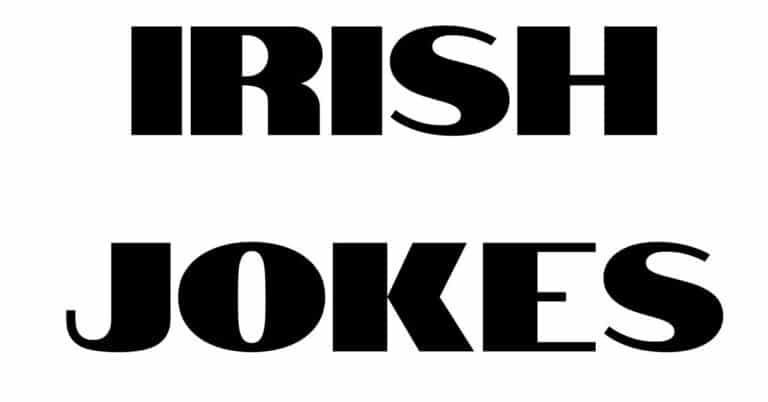
Funny Animal Stories on Bulls
Will and Guy’s collection of amusing bull pictures and funny animal stories.
Angry Bull Causes Traffic Chaos in Scotland
An irate bull caused traffic chaos in Scotland recently after escaping from a field with a bucket stuck on its head.
Will and Guy were told that the large bull caused chaos after wandering blindly onto a busy road in South Ayrshire, Scotland, just after lunchtime recently having escaped from a nearby field.
Frustrated motorists were left stranded in lengthy tailbacks on the A77 Ballantrae to Girvan Road as the rampaging bull blocked all moving traffic.
Police were quickly called to the scene, as the visibly distressed animal struggled to free its head from the round metal dish.
There were delays for more than 45 minutes along the road as police services dealt with the incident, according to local media reports.
The farmer who owned the bull was eventually alerted to the breach of security before managing to gain control of his escaped livestock. After removing the feeding tray from his animal’s head, the farmer also saw to repairing his trampled security fence.
We have a picture here:
Guy says it looks like a hat.
Will says that color does not suit him.
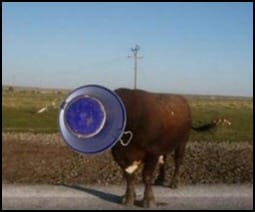
The Trapped Bull
Here is the situation, Jenny the farmer’s wife looks out of her window. What does she see but a bull in a field with his head caught between the bars of a feeder?
Jenny calls the fire brigade. Their siren only makes the bull more agitated. When they appraise the situation they realize they are not equipped to deal with cattle, so they phone for the RSPCA inspector to help free the animal.
Six hefty firemen and the inspector push and pull the beast and eventually, they wrestle its head from between the bars.
The bull was, by now, very angry and turned snorting at the men and began to attack them.
Fearing for their life, they hide in the animal feeder.
Whereupon the farmer’s wife burst into tears of joy followed by tears of laughter.
Jenny was now able to rescue the rescuers. All she did was get the bull’s old milk bottle, half fill it with milk, put on the teat, and use it to lead the bull from the animal feeder into the farmyard and close the gate.
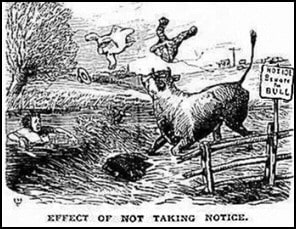
Bull Runs Amok and Devastates Home
You have probably heard the expression, ‘Like a Bull in a China Shop’ but how about a like a bull in a family home? We have learned that a red-brown Limousin bull which escaped from a farmer near Aachen, Germany, later careered through a house.
‘It came in the back and went out the front,’ reported a surprised Police spokesperson. Having done a grand tour of the house inspecting the hall, kitchen, and living room the bull left by the front door Will and Guy have been informed. In its destructive way, it managed to create nearly £8,000 [$16,000 USD] worth of damage. No people were hurt while the bull ran riot we are pleased to say. However, the bull was later put down.
The Pamplona Bull Run
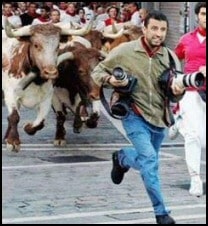
The Pamplona Bull Run takes place from the 7th to the 14th of July. The human runners are clad in white with a red neckerchief. The run starts at 7.30 am. For the bull run, the streets are walled off so that the bulls can’t escape into the town.
An Amusing Bull Story
Farmer John got into his Toyota 4 x 4, drove to the neighboring ranch, and knocked at the door. A young boy, Steve, aged about 9, opened the door.
‘Is yer Dad home?’ John demanded.
‘No, sir, he ain’t,’ Steve replied. ‘He went into town.’
‘Well, then,’ inquired John, ‘is yer Mom here?’
‘No, sir, she ain’t here neither. She went into town with Dad.’
‘How about your brother? Is he here?’
‘He went with Mom and Dad,’ explained Steve patiently.
Farmer John stood there for a few seconds, shifting from one foot to the other and muttering to himself.
‘Is there anything I can do for ya?’ Steve asked politely. ‘I know where all the tools are if you want to borrow one. Or maybe I could take a message fer Dad.’
‘Well, it’s difficult,’ answered John uncomfortably, ‘I really wanted to talk to yer Dad. It’s about your brother Ralph getting my daughter pregnant.’
Steve considered for a moment, ‘You would have to talk to Pa about that,’ he finally conceded. ‘If it helps you any, I know that Pa charges $750 for the bull and $80 for the hog, but I don’t know how much he gets for Ralph.’
Mooving On
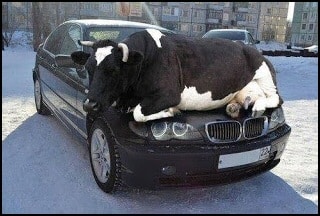
As reported in the Guardian (UK).
Can’t help thinking it must be a photo-shopped spoof as I’ve found the
same picture in several places!
Funny Animal Stories on Cats and Dogs
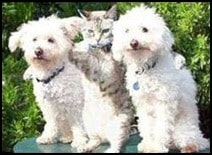
Here are unusual, yet funny animal stories of cat and dog cooperation.
Cat and Dog Sharing
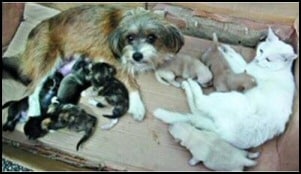
Let’s continue our funny animal stories on cats and dogs.
A cat and a dog, which have recently given birth in China, are taking turns to look after the “kids” for each other. Both animals are owned by Gao Shunhong, of Fushun, Liaoning Province, China, who adopted the dog two years ago and the cat one year ago.
‘They get along together incredibly well for a cat and dog,’ he told the Fushun Daily newspaper. Two weeks ago, the cat gave birth to a litter of two kittens, and three days later, the dog produced a litter of six puppies.
‘Both mothers put their cubs together in the same box, and rotate in nursing them,’ said Gao. ‘When the dog is out, the cat will lie down and nurse the kittens and puppies, and when the dog comes back, the cat would go out, leaving the nursing job to the dog. If both mothers are in, the cubs can get quite mixed up, with the cat nursing the puppies, and the dog nursing the kittens. It’s really odd – but a great picture of harmony.’
Cat or Dog – Which Are You Like?
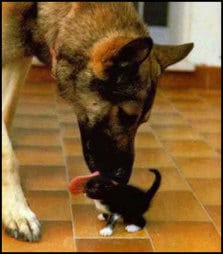
There is much you can learn from dogs: loyalty, courage, and an unconditionally loving and positive attitude.
Cats teach you independence, dignity, mutual respect, and being yourself, for instance.
Will and Guy believe there lot more funny animal jokes to learn from both of these pets.
Chinese Dog Adopts Kittens
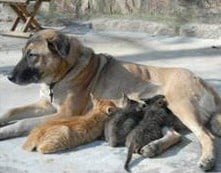
Here is a true cat and dog story where a bitch is nursing a litter of kittens that were orphaned when their mother died.
Their owner, Cai, of Jiangmen, China said he has been raising cats and dogs together for more than 10 years, and they all got along together well, however, this was the first time he had ever seen kittens being nursed by a dog.
The four kittens seemed happy and content with their new mother’s milk, while the dog was tending to its adopted family with love and care. ‘Several days ago, the kittens’ mother died after eating a poisoned rat, leaving behind a litter of kittens without a source of milk,’ Cai volunteered. ‘The kittens’ cries may have stirred the dog’s maternal nature since it too had recently given birth. It volunteered to take over and feed the kittens of its old friend.’
The dog’s own puppies had been taken away by one of its grown-up offspring. Cai mused, ‘That’s perhaps another reason why the dog adopted the kittens. She lost all of her own children.’
Differences in Cat and Dog Diaries
Differences between cats and dogs often inspire funny animal stories.
Below, we’ll introduce funny animal stories as diaries:
Dog’s Daily Diary:
8:00 am – Dog food! My favorite thing!
9:30 am – A car ride! My favorite thing!
9:40 am – A walk in the park! My favorite thing!
10:30 am – Got rubbed and petted! My favorite thing!
12:00 pm – Lunch! My favorite thing!
1:00 pm – Played in the yard! My favorite thing!
3:00 pm – Wagged my tail! My favorite thing!
5:00 pm – Milk bones! My favorite thing!
7:00 pm – Got to play ball! My favorite thing!
8:00 pm – Wow! Watched TV with the people! My favorite thing!
11:00 pm – Sleeping on the bed! My favorite thing!
If you liked that, you’ll like our next part of funny animal jokes as well!
Cat’s Diary:
Day 683 of my captivity:
My captors continue to taunt me with bizarre little dangling objects. They dine lavishly on fresh meat while the other inmates and I are fed hash or some sort of dry nuggets.
Although I make my contempt for the rations perfectly clear, I nevertheless must eat something to keep up my strength.
The only thing that keeps me going is my dream of escape.
In an attempt to disgust them, I once again vomited on the floor. Today I decapitated a mouse and dropped its headless body at their feet. I had hoped this would strike fear into their hearts since it clearly demonstrates what I am capable of. However, they merely made condescending comments about what a “good little hunter” I am. The audacity!
There was some sort of assembly of their accomplices tonight. I was placed in solitary confinement for the duration of the event. However, I could hear the noises and smell the food. I overheard that my confinement was due to the power of “allergies.” I must learn what this means, and how to use it to my advantage.
Today I was almost successful in an attempt to assassinate one of my tormentors by weaving around his feet as he was walking. I must try this again tomorrow – but at the top of the stairs.
I am convinced that the other prisoners here are flunkies and snitches.
The dog receives special privileges. He is regularly released – and seems to be more than willing to return. He is obviously retarded!
The bird has got to be an informant. I observe him communicating with the guards regularly. I am certain that he reports my every move. My captors have arranged protective custody for him in an elevated cell, so he is safe …for now!
Funny animal stories on Ferrets
In this section, we’ll provide more funny animal stories, this time on ferrets.
Here are three funny animal stories on ferrets:
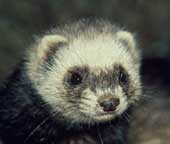
1) What a Hotel in York Keeps in Its Wine Cellar:
Staff at a Grade I listed Georgian townhouse hotel in the center of York, England welcomed an unusual guest in from the pouring rain – a drenched ferret. The ferret scuttled into the Judges’ Lodgings Hotel when the door opened one wet night, reports the Yorkshire Evening Press.
Staff named the ferret Pierre, because they thought he looked French, and they have ‘ put him up’ in a cardboard box in the wine cellar. They say he seems tame – despite nipping a number of workers – and are hoping the ferret’s owner comes forward to take him home.
Duty manager Catherine Bell said, ‘We’d opened the door to let someone come in, and the ferret scuttled in with them.’ He was soaking wet, so I think he’d been outside for at least a couple of hours.’
Assistant manager Julie Smith continued, ‘The night porter caught him and put him in the wine cellar, in a crisp box.’ We did some research on the internet and found that ferrets like kitten food. So, We’ve gone out to buy some. He has bitten some people, but so far he’s left me alone.’
2) Ferret with only two legs
At the fabric counter of Heelas department store [John Lewis] in Reading, UK, the very pretty Rebecca enquired of the male counter staff, ‘I would like to buy this material for a new dress. How much does it cost?’
‘Only one kiss per meter, ‘replied the young man with a rather unpleasant ferret-like smirk.
‘That’s OK, ‘answered Rebecca, with a glint in her eye, ‘I’ll take eight meters.’
With expectation and anticipation written all over his face, the staff member quickly measured out the cloth, wrapped it up, and then in a teasing fashion held it out.
Rebecca snapped up the package, pointed to the old, grizzled, and toothless fellow standing beside her, smiled, and said, ‘My Grandad will pay the bill.’
3) Interesting Facts About Ferrets
- Male ferrets are called hobs, while females are called jills. Their children are called kits for the first 7 weeks, by which time they look like adults. All gender names change if they are neutered, the males are then gibs, and the female’s sprites.
- The collective noun for a group of ferrets is a ‘business’. Other names for families of ferrets are: cast, or possibly, fesnying.
- Ferrets make for an interesting and unusual pet. Owners love them because they are inquisitive while awake, or else they just sleep. They are also relatively easy to house train and can interact with other pets such as cats or dogs.
- Hearing is their most strongly developed sense, presumably linked to their ability to survive underground in nature.
- Ferret racing is making a come-back in England, it’s a popular way of raising money at fetes and craft shows.
Funny Animal Stories on Parrots
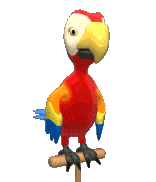
What is it about parrots that makes them so funny? Probably it’s their ability to mimic that makes the parrot a constant source of jokes and funny animal stories.
Thief and the Parrot Story
Late one night, a burglar broke into a house that he thought was empty. He stealthily crept through the lounge and was stopped dead in his tracks when he heard a loud voice clearly saying, ‘Jesus is watching you!’
Silence returned to the house, so the burglar crept forward again. ‘Jesus is watching you’, the voice rang out again.
The thief stopped dead again. He was frightened out of his wits. Frantically, he looked all around. In a dark corner, he spotted a birdcage, and in the cage was a parrot.
He asked the parrot, ‘Was that you who said Jesus is watching me?’
‘Yes’, said the parrot.
The burglar breathed a heavy sigh of relief and asked the parrot: ‘What’s your name?’
‘Moses’, said the bird.
‘That’s a stupid name for a parrot, ‘sneered the burglar. ‘What idiot named you Moses?’
The parrot said, ‘The same idiot who named the Rottweiler Jesus.’
[Thanks to Vanessa for correcting this parrot joke]
Real-Life Thief and Parrot Story
Funny animal stories on parrots happen in real life as well:
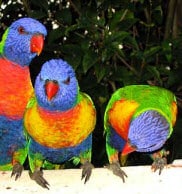
Border guards in Belarus are hunting a man who tried to smuggle almost three hundred parrots into the country on the back of a bicycle. The guards saw the man while out on a routine patrol along the border with Ukraine. When they called him to stop he jumped off the bike and fled into nearby forests so the guards searched his boxes.
To their great surprise, they found the birds crammed into six boxes strapped to the back of the bike. Two of the birds died but the rest were checked by vets who gave them a clean bill of health and passed them on to an animal sanctuary.
Parrot at Auction
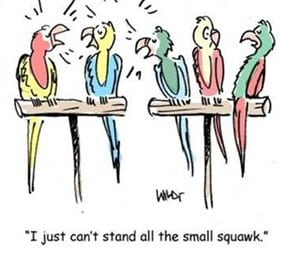
One day David went to an auction. While he was there, he bid for a parrot. David wanted this bird, so he got caught up and thoroughly involved in the bidding. He kept on bidding but kept getting outbid, so he bid higher and higher and higher.
Finally, after he had bid much more than he had intended, David won the bid; the parrot was his at last.
As he was paying for the parrot, he said to the auctioneer, ‘I hope this parrot can talk. I would hate to have paid this much for it, only to find out that he can’t talk!’
‘Don’t worry.’ said the auctioneer, ‘He can talk. Who do you think kept bidding against you?’
This one is Will’s favorite among these funny animal stories.
Parrot Saves Man
A noisy parrot that enjoys imitating sounds has helped save a man and his son from a house fire by sounding like a smoke alarm, the bird’s owner reports. Shannon Conwell, 33, said he and his 9-year-old son fell asleep on the sofa while watching a film. They awoke at about 3 o’clock in the morning to find their home on fire after hearing the family’s Amazon parrot, Peanut, imitating a fire alarm.
‘He was really screaming his head off,’ Conwell said. The smoke alarm had activated, but it was the bird’s call that caught Conwell’s attention. ‘I grabbed my son and my bird, and got out of the house,’ he said. The fire destroyed the home’s dining room, kitchen, and bedroom, in Muncie, Indiana, USA, fire officials said. Aside from Peanut, Conwell said the fact that he and his son fell asleep on the couch helped save them. They may not have heard the alarm or the bird if they were asleep in their bedrooms.
And this one is among funny animal stories that are a bit more emotional.
More Funny Animal Stories on Parrots
Parrot-themed funny animal stories don’t stop there! Here’s another one:
A parrot spent five days under police ‘interrogation’ in an Argentina prison
The judge ordered Pepo the parrot to be held in custody until he told police who was his real owner, reports UOL.
Two neighbors, Jorge Machado and R Vega, were disputing ownership of the bird.
Judge Osvaldo Carlos decided the parrot should be kept in prison until he said the name of his owner.
After five days, Pepo said Jorge’s name, and the parrot also sang the anthem of his favorite football team San Lorenzo.
Mr. Machado said: ‘I knew he wasn’t going to let me down, he is a real friend and we support the same football team’. This parrot story shows that sometimes fact is stranger than fiction.
Mama’s Parrot Story
This is a part of funny animal stories featuring “mama”.
Police called out to investigate reports of a young child left home alone and found a talking parrot instead. Police were called to the house in Koblenz, Germany, by an elderly lady who said she could hear a child next door constantly screaming, ‘Mama, Mama’. The woman felt the child must have been left home alone as nobody was answering the cries. When officers broke into the house they found the cries were coming from a 25-year-old talking parrot.
Mynah* Mimics Cat’s Miaow
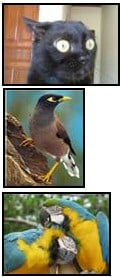
What a palaver can result when you find that your two newly bought parrots make a great deal more noise than you wanted or expected. Often we read about loud-mouthed parrots irritating their neighbors because they can learn to talk and particularly, to swear. However, a slightly different issue arose when Mr. Jiang bought his two birds. They drove his Mynah bird quite mad with their incessant chatter.
The problem befell Mr Jiang, of Nanjing, China, who purchased the birds in good faith and took them home to live in the same room as his pet Mynah bird. The Mynah had been taught by Mr Jiang to speak Chinese to attract more business Will and Guy have learned from the Yangtze Evening Post.
The talkative parrots annoyed the Mynah bird so much with their prattling that he became very upset, angry, and frenetic. Then the mynah noticed that when a neighboring cat came to visit and miaowed, the parrots suddenly were very quiet, Mr Jiang explained to us.
The Mynah then listened carefully and amazingly began to mimic the cat’s sound and now has managed, on several occasions, to shut the noisy parrots up by loudly miaowing.
Brilliant, say Will and Guy; you just couldn’t make it up.
*Mynah bird can be spelled with or without an h: both spellings are correct: Myna and Mynah.
Cat with Parrot – or Parrot with Cat
Can you explain funny animal stories below?
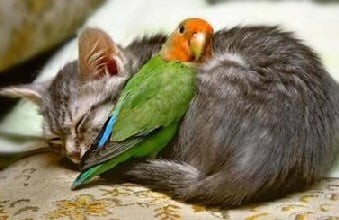
Parrots Show Tendency to be “Left-Handed”
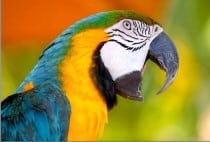
Parrots, like humans, show a preference to use one side of their body more than the other, with more of them left-handed, or left-footed, Will and Guy have recently read.
Australian researchers found that virtually all the parrots they studied prefer to use either their left eye and left foot, or right eye and right foot. The study, published in “Biological Letters”, examined roughly 320 parrots from 16 different Australian species. Ultimately, they found that roughly 47% were left-handed, 33% right-handed, and the remainder ambidextrous.
In addition, in some cases, young birds appeared to experiment with both sides before finally settling on one.
The idea of “handedness” in humans, adds Guy, is tied to the use of one hemisphere of the brain over another, known as ‘lateralization.’ This interesting fact inspired a lot of funny animal stories.
Funny Animal Stories of George and the Parrot
Funny animal stories below are dedicated to George the parrot.
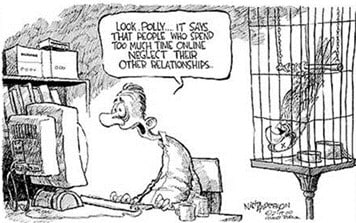
Chippenham George, the postman, is working on a new postal round in Fareham. He comes to a garden gate in Acacia Avenue marked “Beware of the Parrot”.
George looks down the garden and, sure enough, there’s a parrot sitting on its perch. He has a little chuckle to himself at the sign and the parrot there on its perch.
The mailman opens the gate and walks into the garden.
George reaches the parrot’s perch when suddenly, it calls out loudly,
‘Rover, attack.’
Strange Yet Funny Animal Stories – Interesting Facts About Parrots
Nothing succeeds like a parrot with no teeth!
Below, we’ll discuss some funny animal jokes on parrots that are true.
1. Parrot Exposes Cheating Husband
A cheating husband was exposed after his wife’s parrot mimicked his voice calling out another woman’s name.
Frank Ficker, 50, has now been kicked out of the family home by wife Petra, also 50, after she heard their 12-year-old parrot Hugo impersonating him on the phone to another woman.
Petra, of Freiburg, Germany, said, ‘Hugo always liked to mimic Frank, and he could do his voice perfectly.
‘Frank asking who’s at the door, Frank yelling at our nephews, Frank telling me he loved me. And then one day I heard him doing Frank’s voice, but saying ‘Uta, Uta’.’
Petra turned the house upside down and found two plane tickets for a weekend break in Paris booked for her husband – and a mystery woman named Uta.
She said, ‘I kicked him straight out. It’s just me and my parrot now.’
2. Don’t Talk to my Parrot
Wanda’s dishwasher quit working so she called a repairman. Since she had to go to work the next day, she told the repairman, ‘I’ll leave the key under the mat. Fix the dishwasher, leave the bill on the counter, and I’ll mail you a check.’ ‘Oh, by the way, don’t worry about my bulldog Spike. He won’t bother you. But, whatever you do, do NOT, under ANY circumstances, talk to my parrot!’
‘I REPEAT, DO NOT TALK TO MY PARROT!!!’ When the repairman arrived at Wanda’s apartment the following day, he discovered the biggest, meanest-looking bulldog he had ever seen.
Just as she had said, the dog just lay there on the carpet watching the repairman go about his work. The parrot, however, drove him nuts the whole time with his incessant yelling, cursing, and name-calling. Finally, the repairman couldn’t contain himself any longer and yelled:
‘Shut up, you stupid, ugly bird!’ To which the parrot replied, ‘Get him, Spike!’
So, you see, men just don’t listen!
3. Parrot-Napping?
The above funny animal stories on a parrot reminds us of a case of parrot-napping in Margate, Kent, England. Sue Parsons had an African Grey called ‘Pickle’. In January 2008 Pickle disappeared from Sue’s doorstep.
Then Sue heard that a similar parrot arrived in a nearby pub called the King Edward VII. Naturally, Sue visited the pub and when she checked out the parrot, she thought it was her missing Pickle. The faces were the same (do they all look the same), however, it repeated the noises Sue made instantly.
The pub landlady disputes Ms Parson’s claim and refuses to hand over the parrot for DNA testing. Will and Guy cannot help thinking they should fly in Judge Osvaldo Carlos, as he solved the Argentinian case above.
4. Referee Sends Off Parrot
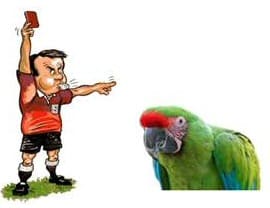
Bird ‘Red-Carded’ at Soccer Match
A parrot has caused chaos at a football match. The parrot, known as Me-Tu was accompanying owner Irene Kerrigan to a game between Hertfordshire Rangers and Hatfield Town, England, recently.
Will and Guy have established that the referee Gary Bailey, sent the large green parrot from the touchline because, ‘Every time I blew my whistle the bird made the same sound. The players all stopped so I had to ask her to move the parrot. I’ve never sent off a parrot before.’
As well as whistling Me-Tu also shouted “pretty boy” at the players from his cage on the sidelines. Ms Kerrigan told us, ‘He loves his football and I’ll take him back down there.’
Incidentally, Hatfield Town beat the parrot’s team 5-2.
5. Mama’s Parrot Story
Again, let’s share some more funny animal stories about parrots screaming ‘mama’.
Police called out to investigate reports of a young child left home alone and found a talking parrot instead. Police were called to the house in Koblenz, Germany, by an elderly lady who said she could hear a child next door constantly screaming, ‘Mama, Mama’. The woman felt the child must have been left home alone as nobody was answering the cries. When officers broke into the house they found the cries were coming from a 25-year-old talking parrot.
6. Macaw Parrot Teaches African Greys to Swear
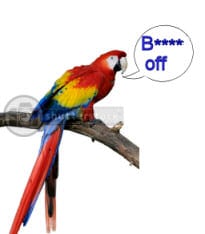
It’s strange how parrots mimic children’s behavior. For example, the more that you try and
stop young children from swearing the more they repeat the offending words.
Geoff Grewcock owns the Warwickshire Wildlife Sanctuary in Nuneaton, England. He has had trouble with Barney his macaw parrot swearing. The more Geoff has tried to stop Barney, the more he swears.
Another feature of naughty children and parrots is that they reserve their worst behavior for your most important guests. It may have been asking for trouble to have Barney around when the mayor came on a civic visit. True to form, Barney swore at the Mayor, and when the vicar tried to diffuse the situation, Barney swore at him too.
Another thing that naughty children do is teach swear words to their best friends. Again there is a parallel with parrots. Lately, Barney has incensed his patriarch Geoff Grewcock by teaching his offensive vocabulary to Sam and Charlie who are African greys.
Hope you agree that this story deserves to be among our funny animal stories.
7. Interesting Facts About Parrots
As a part of our funny animal stories, we’ll also share some facts about parrots.
- The African grey is the champion parrot at mimicking and taking. Unusually, in Will and Guy’s experience, it’s the male African grey who is often the better talker, the females just seem to listen – interesting.
- In 2007 it was reported that an African grey called N’kisi, has a vocabulary of over 900 words. That’s 800 more than the average soccer manager, furthermore, unlike most managers, N’kisi has a sense of humor.
- The only trouble with African grey is they don’t look the part. For a genuine pirate-type parrot with attitude, you cannot beat the macaw. (See picture above of swearing parrot)
- Amongst the macaws, it is the Military macaw which is the best talker, however, its conservation status is ‘vulnerable’, so you are better choosing another species.
- Indeed, many species of parrot are endangered, and illegal importing is widespread and cannot be condoned. It is therefore interesting to discover that the monk (green) parakeet often escapes from captivity, and there are now several wild colonies in the USA.
- What makes a parrot a parrot is its curved peak, also its 4 toes, two of which point forward and two backward.
8. Willie the Parrot Saves Baby’s Life
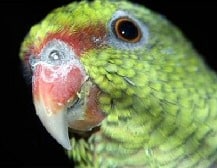
A parrot whose cries of alarm helped save the life of a choking girl in the US has been hailed a hero and awarded the Red Cross’s Animal Lifesaver Award in Denver, Colorado, USA, Will and Guy have discovered.
As baby Hannah was choking on her breakfast, Willie the Parrot saw that she was turning blue so he caused a commotion by flapping his wings noisily whilst squawking, ‘Mama! Baby!’
Megan Howard, Hannah’s mother heard his cries and was able to save Hannah’s life by applying the *Heimlich maneuver.
Yet another marvelous one among these funny animal stories.
*Heimlich manoeuvre:
- From behind, wrap your arms around the victim’s waist.
- Make a fist and place the thumb of your fist against the victim’s upper abdomen, below the ribcage, and above the navel.
- Grasp your fist with your other hand and press into their upper abdomen with a quick upward thrust. Do not squeeze the ribcage; confine the force of your thrust to your hands.
- Repeat until the object is expelled.
9. More Parrot Snippets
More funny animal stories include parrot snippets.
The nocturnal, flightless kakapo from New Zealand is one of the world’s rarest birds. As well as being easy prey for rats and dogs, its mating ritual does them no favors. The male constructs a mating court on top of a mountain, excavating several shallow “bowls” connected by a series of
tracks, which he keeps scrupulously clean. Every evening, he hunkers down in each of his bowls in turn, pumps up a special air sac, and emits a sequence of low-frequency “booms” that can be heard three miles away.
It may take him months to attract a female, during which time he can lose half his body weight. Some females shuffle 20 miles. If both are still in the mood, they mate for 10 minutes and then she walks home again and tries not to get eaten.
Funny Animal Stories on Pigs
What is it about pigs that generates so much mirth? Even when you see live pigs they always seem to be up to mischief or have just returned from an adventure.
And this is the first one among our funny animal stories about pigs.
‘Not Rearing Pigs’ Business – Funny Pigs Story
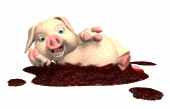
NIGEL JOHNSON-HILL, PARK FARM, LIPHOOK GU30 7JF
Rt Hon David Milliband MP
Secretary of State,
Department for Environment, Food and Rural Affairs (DEFRA),
London SW1P 3JR
1st July 2007
Dear Secretary of State Milliband
My friend, who is in farming at the moment, recently received a cheque for £3,000 from the Rural Payments Agency for not rearing pigs. I would like to join the ‘not rearing pigs’ business.
In your opinion, what is the best kind of farm not to rear pigs on, and which is the best breed of pig not to rear? I want to be sure I approach this endeavor in keeping with all government policies, as dictated by the EU under the Common Agricultural Policy. I would prefer not to rear bacon pigs, but if this is not the type you want not rearing, I will gladly not rear porkers. Are there any advantages in not rearing rare breeds such as Saddlebacks or Gloucester Old Spots, or are too many people already not rearing these?
As I see it, the hardest part of this program will be keeping an accurate record of how many pigs I haven’t reared. Are there Government or Local Authority courses on this?
My friend is very satisfied with this business. He has been rearing pigs for forty years or so, and the best he ever made on them was £1,422 in 1968. That is until this year when he received a cheque for not rearing any.
If I get £3,000 for not rearing 50 pigs, will I get £6,000 for not rearing 100?
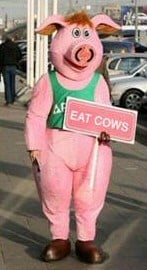
I plan to operate on a small scale at first, holding myself down to about 4,000 pigs not raised, which will mean about £240,000 for the first year. As I become more expert in not rearing pigs, I plan to be more ambitious, perhaps increasing to, say, 40,000 pigs not reared in my second year, for which I should expect about £2.4 Million from your department. Incidentally, I wonder if I would be eligible to receive tradable carbon credits for all of these pigs not producing harmful and polluting methane gas.
Another point: These pigs that I plan not to rear will not eat 2,000 tonnes of cereals. I understand that you also pay farmers for not growing crops. Will I qualify for payments for not growing cereals to not feed the pigs I don’t rear?
I am also considering the ‘not milking cows’ business, so please send any information you have on that too. Please could you also include the current Defra advice on set-aside fields? Can this be done on an e-commerce basis with virtual fields (of which I seem to have several thousand hectares)?
In view of the above, you will realize that I will be totally unemployed, and will therefore qualify for unemployment benefits.
I shall of course be voting for your party at the next general election.
Yours faithfully
Nigel Johnson-Hill
More Funny Animal Stories on Pigs
We haven’t finished sharing funny animal stories about bigs just yet.
How Not to Celebrate a Wedding Anniversary
Old farmer Jethro and his wife Aggie were walking down to their pig pen when Aggie dropped into the conversation that next month was their golden wedding anniversary.
Aggie continued, ‘Let’s have a party, Jethro, and invite all our children and grandchildren. And why don’t we kill one of our prize pigs to celebrate?’
Jethro thought about this scratched his head and replied. ‘Gee, Aggie, I don’t see why that pig should take the blame for something that happened fifty years ago.’
Karl Put His Foot In It
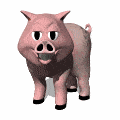
In a small town just south of Hicksville, seven pig farmers from the surrounding area met to discuss important topics, such as boundaries, the price of feed, and who has the best tractor. After a while Jessie one of the farmer’s wives, interrupted the meeting and spoke about the need to be prudent at this time.
When she had finished, Karl one of the old farmers stood up and said, ‘What does Jessie know about anything?’ I would like to ask her if she knows how many toes a pig has?’
Quick as a flash, Jessie replied, ‘Why, take off your boots Karl, and count them yourself!’
This Little Piggy Went to Market – Classic Nursery Rhyme
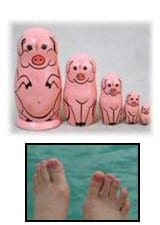
Here is simply the most wonderful children’s nursery rhyme which is also one of the best funny animal stories. The trick is to tickle the child’s toes as you recite the verse:
- This little piggy went to market,
- This little piggy stayed home,
- This little piggy had roast beef,
- This little piggy had none,
- And this little piggy cried,
- ‘Wee, wee, wee.’
- All the way home.
The words for ‘This little piggy’ nursery rhyme are used to point out each one of the child’s toes. The last line in ‘This Little Piggy’ is used to accompany the child being tickled by the narrator of the poem. This rhyme is extremely popular which ensures that it will be passed from generation to generation.
The first publication date for the words and lyrics for this nursery rhyme was in 1728.
Will remembers playing ‘This Little Piggy Went to Market’ with his children when they were young.
Trivia About Hogs, Pigs, and Swine
Next, we prepared a trivia as a part of our funny animal stories.
- Scientists believe that pigs are one of the most intelligent animals, ranking close behind apes and dolphins.
- China has the world’s largest population of domestic pigs
- The average sow gives birth to 8 to 12 pigs at a time.
- An average pig eats five pounds of feed each day, or a ton of food every year.
- A pig’s squeal can be as loud as 115 decibels, 3 decibels higher than the sound of a supersonic airliner.
- An average American consumes 51 lbs of pork each year.
- Pigs do not have sweat glands and pale pigs risk sunburn, hence they roll in mud to keep themselves cool.
- A number of pigs together is called a herd.
- A piece of lead used in a ship’s ballast is called a hog.
- One of the smaller molds used for casting iron is called a hog.
- A curling rock that is not thrown far enough to get over the hog line is called a hog.
- A pig raised for meat is called a hog.
- A broom for scraping the underside of a ship is called a hog.
- A large railway locomotive is called a hog.
- A Harley Davidson motorcycle is called a hog.
- In the UK, a sixpenny coin was called a hog.
- Pork is the world’s most widely eaten meat.
- In Denmark, there are twice as many pigs as people.
- There are approximately 840 million hogs on farms throughout the world.
- On average, pigs live for about 15 years.
- The largest pig on record was a Poland-China hog named Big Bill, who weighed 2,552 lbs [1157.4 kg] owned by Burford Butler of Jackson, Tennessee, USA in the year 1933.
- Here is the feisty starlet girlfriend of Kermit the Frog from the Muppets – Miss Piggy

Funny Animal Stories and Homing Pigeon Jokes
Now, let’s focus on some funny animal stories that feature pigeons. After all, pigeons are main characters of plenty of funny animal stories.
Funny Pigeon Story
The baby pigeon complained to his mother before flying a long distance, ‘I can’t make it, I’ll get too tired.’

His mother replied, ‘Don’t worry, I’ll tie a piece of string to one of your legs and the other end to mine.’
The baby started to cry.
‘What’s wrong?’ asked the mother sympathetically.
‘I don’t want to end up being pigeon towed.’
Pigeon Tracking
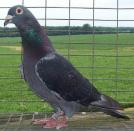
Reported by Reuters News Agency [London] on February 1 that a flock of pigeons fitted with mobile phone backpacks is to be used to monitor air pollution over the skies of San Jose, California. The idea is the brainchild of researcher Beatriz da Costa, of the University of California at Irvine, and two of her students.
Each of the 20 birds will be released in August 2006 and carry a GPS satellite tracking receiver, air pollution sensors, and a basic mobile phone, capable of detecting carbon monoxide and nitrogen dioxide.
Text messages on air quality will be beamed back in real time to a special pigeon ‘blog’, a
journal accessible on the Internet. Miniature cameras slung around the pigeons’ necks will also post aerial pictures. The data they send back will be displayed on the blog in the form of an interactive map.
Fake Pigeon Story
Funny animal stories on pigeons aren’t over yet.
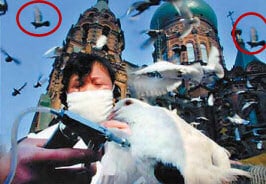
Will and Guy bring you the story behind the pigeon story. Zhang Liang, apologized for his ‘bad behavior’ when he forged a picture of pigeons receiving bird flu vaccine shots from medical workers.
Amazingly this picture won first prize in the 2005 China International Press Photo Contest. ‘I would like to apologize to the public,’ said Liang, who was dismissed from Harbin Daily.
He copied the pigeon in the top right corner of his photo and pasted it in the top left corner.
‘I did it to make the photo perfect,’ Zhang was quoted as saying. ‘It was the first time for me to perfect pictures with computer technology and I did it only once.’
Bread Statue – Popular with Pigeons
And here are some more funny animal stories on pigeons.
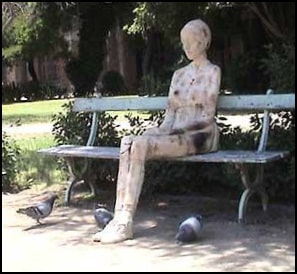
A statue of a woman made out of bread is proving popular with pigeons in a park in Santiago, Chile.
Constanza Puente’s latest work is a life-size self-portrait of the 6-foot-tall artist.
Las Ultimas Noticias, reports that her bread sculpture is on public display on the grounds of the Chilean capital city’s Catholic University Extension Centre.
Pigeons Revenge
In the pictures below, we put pictures that represent funny animal stories about revenge.
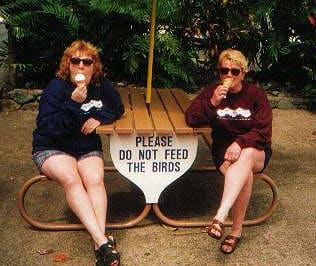
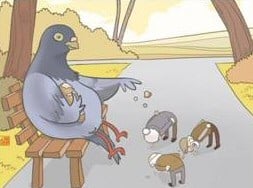
Hilarious funny animal stories on Piegons
The next part of our pigeon-themed funny animal stories are shorts.
- Accept that some days you are the pigeon and some days the statue – Dilbert [Scott Adams]
- France has found a unique way of controlling its unwanted critter population. They have done this by giving unwanted animals like snails, pigeons, and frogs fancy names, thus transforming common backyard pests into expensive delicacies. These are then served to gullible tourists, who will eat anything they can’t pronounce – Chris Harris
St Mark’s Square Venice – Unpopular with Pigeons
The mayor of Venice, Italy had a tricky decision to make. Pigeon feeding in St. Mark’s Square had become a tradition and supported an industry of supplying and selling grain to feed the birds. However, the pigeon droppings and their pecking at statues to get the last seed were causing damage to the fabric of the city.
Dealing with the pigeon problem is part of a bigger plan to improve decorum and cleanliness in St Mark’s Square. Tourists who litter can also be fined. They are also told to cover up and not to walk around bare-chested.
The mayor decided to ban the sale and distribution of grain to feed the birds. Those who ignore his ban ban will be fined 50 Euros It is estimated that cleaning the monuments and repairing the damage caused by pigeons was costing each Venetian taxpayer 250 Euros each year.
Will and Guy hope that other cities take Venice’s example and try and reduce the pigeon populations which are solely sustained by people feeding them scraps. This fact inspires plenty of funny animal stories.
Pigeon Entrepreneur
Surprisingly, entrepreneur pigeons are an integral part of funny animal stories.
Did you hear about the man who became a millionaire with one homing pigeon?
He sold it for a dollar and it kept coming home a million times!
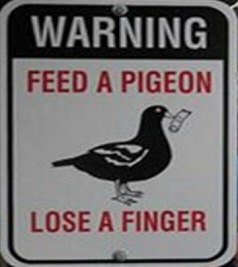
Pigeon Spy Story – Iran Arrests Pigeons for Spying

The next funny animal stories are focused on a pigeon spy.
In what Will and Guy think may be a major escalation of tension between Iran and the West, Iranian security forces have announced that they have arrested two pigeons for spying. The two pigeons were detained in Natanz, near Iran’s uranium enrichment facility; one of the major sources of the diplomatic chill between Tehran and Western governments.
According to a report in Etemad Melli, a local newspaper, one of the pigeons was apprehended in the nearby city of Kashan, beside a rose water production plant. Both pigeons were described as having ‘metal rings’ and ‘invisible string’ on their bodies, we have discovered. This is not
the first animal-espionage incident in Iran. In July 2007, it was reported that 14 squirrels had been detained on the Iranian border for spying.
We know from history that animals have long been used in military and intelligence operations, from dolphins being trained to detect mines to chickens recently being used by US forces in Kuwait to discover chemical weapons. During the Second World War, Britain awarded 32 medals for bravery to military pigeons. No third party has yet claimed the pigeons as their own and Will and Guy have been unable to ascertain if the two pigeons are currently being detained, are still alive, or indeed what may happen to them.
Interesting Facts About Pigeons
After reading funny animal stories on pigeons, let’s take a look at some facts:
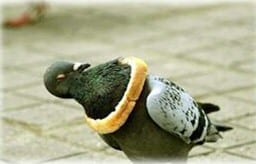
- In bygone times there was an industry in using carrier pigeons as messengers. The military rules of the Middle East first developed this communication method.
- Messenger pigeons were still used in World War II.
- This ability lives on in some areas in the form of racing homing pigeons. It’s hard to believe, but pigeons can reach 100mph in flight.
- Other members of the Rock Pigeon have been selectively bred for the ‘Dove Ceremonies’ that you occasionally see at weddings or funerals.
- In some parts of the world, there is a whole industry in raising squabs for their meat – it tastes like chicken!
And now, here’s the best part of funny animal stories on pigeons:
More Fascinating Pigeon Information
To keep alive in the wild, a pigeon needs to keep its eyes open for predators. Having eyes on the side of its head gives it a field of view of 340 degrees and, in order to fly at speed, its brain can process visual information three times faster than a human’s.
If a pigeon watched a feature film, 24 frames per second would appear to it like a slide presentation. They would need at least 75 frames per second to create the illusion of movement on screen. [This is why pigeons seem to leave it until the very last second to fly out of the way of an oncoming car: it appears much less fast to them.]
Now we’re finished with pigeons and our funny animal stories will focus on different animals.
Funny Animal Stories on Rabbits
The next animal on our list of funny animal stories is a rabbit. We’ll discuss both classic and new funny animal stories on rabbits.
A Classic Rabbit Yarn by Pauline Henderson

A rabbit walks into a pub and says to the barman, ‘Can I have a pint of beer and a ham and cheese toastie?’ The barman is amazed but gives the rabbit a pint of beer and a ham and cheese toastie. The rabbit drinks the beer and eats the toastie, he then leaves.
The following night the rabbit returns and again asks for a pint of beer and a ham and cheese toastie. The barman, now intrigued by the rabbit and the extra drinkers in the pub (because word gets round) gives the rabbit the pint and the toastie. The rabbit consumes them and leaves.
The next night, the pub is packed, in walks the rabbit and says, ‘A pint of beer and a ham and cheese toastie, please barman.’ The crowd is hushed as the barman gives the rabbit his pint and toastie and then bursts into applause as the rabbit wolfs them down.
The next night there is standing room only in the pub, coaches have been laid on for the crowds of patrons attending, the barman is making more money in one week than he did all last year. In walks the rabbit and says, ‘A pint of beer and a ham and cheese toastie, please barman, ‘smiling and accepting the tributes of the masses. The barman says, ‘I’m sorry rabbit, old mate, old mucker but we are right out of them ham and cheese toasties’. The rabbit looks aghast, the crowd has quietened to almost a whisper, when the barman clears his throat nervously and says, ‘We do have a very nice Cheese and Onion Toastie.’ The rabbit looks him in the eye and says, ‘Are you sure I will like it?’ The masses’ bated breath is ear-shatteringly silent. The barman, with a roguish smile, says, ‘Do you think that I would let down one of my best friends, I know you’ll love it.’ Ok, ‘says the rabbit, ‘I’ll have a pint of beer and a cheese and onion toastie’. The pub erupts with glee as the rabbit quaffs the beer and guzzles the toastie, he then waves to the crowd and leaves…
There are more rabbit stories coming as a part of our funny animal stories.
Never To Return
One year later in the now impoverished public house, the barman (who has only served 4 drinks tonight, 3 of which were his) calls time. When he is cleaning down the now empty bar, he sees a small white form, floating above the bar. The barman says, ‘Who are you?’ To which he answered, ‘I am the ghost of the rabbit that used to frequent your public house.’ The barman says, ‘I remember you, you made me famous, you would come in every night and have a pint of beer and a ham and cheese toastie, masses came to see you and this place was famous.’ The rabbit says, ‘Yes I know.’ The barman said, ‘I remember, on your last night we didn’t have any ham and cheese toasties, you had a cheese and onion one instead.’ The rabbit said, ‘Yes, you promised me that I would love it’. The barman said, ‘You never came back, what happened?’I DIED’, said the rabbit.’ NO!’ said the barman, ‘what from?’ After a short pause, the rabbit said…
‘Mixin’-me-toasties’
Mad as a March hare – say, Will and Guy.
More funny animal stories: The White Rabbit Marries Alice
We’re keeping on telling funny animal stories on rabbits.
A Love Story from Cornwall, England
Jane and Mark Sharp-Hall’s wedding was so very different since they and their guests all dressed up as characters from the novel ‘Alice’s Adventures in Wonderland’ (commonly shortened to ‘Alice in Wonderland’).
This is one of the nice funny animal stories on rabbits.
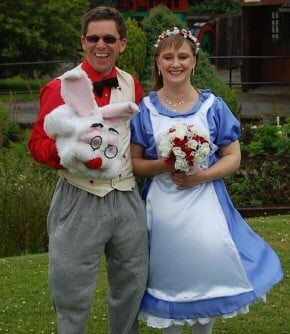
Alice and the White Rabbit
Alice is often included among funny animal stories about rabbits.
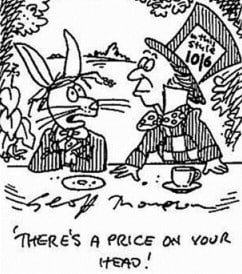
They were married dressed as Alice and the White Rabbit from * Carroll’s 1865 novel, while the best man came as the Mad Hatter, and other guests played the Queen of Hearts, Cheshire Cat, Caterpillar, and 28 playing cards.
‘This is the second time round for both of us and we did it traditionally the last time so we thought we’d do everything a bit differently this time,’ said Mrs Sharp-Hall, who spent more than a year creating the costumes.
* Alias of English author Charles Lutwidge Dodgson
The couple married underground at Poldark Mine in Cornwall, where they also enjoyed a Mad Hatter-inspired tea party – including little ‘Eat Me’ cakes.
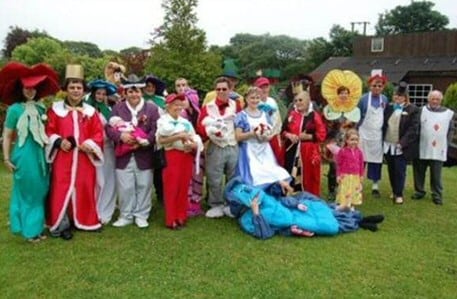
Robin – Bird of Pray | Portchester Story
Some of our funny animal stories are related to robins.
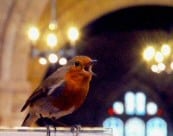
Meet the most vocal member of St Mary’s Church: a tame robin who has made this Portchester church his home.
Robin: A Bird of Pray!
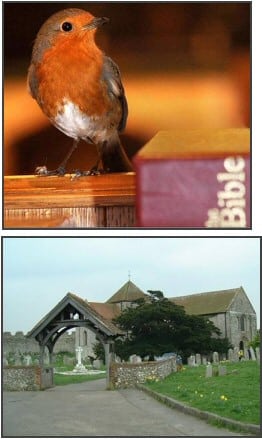
It might not be the largest member of the flock, but this bold robin can easily out-sing all the other churchgoers. The bird has become a fixture at 12th-century St Mary’s in Portchester Castle, Hampshire after fluttering in during the worst snow of the winter.
Interestingly, the village of Portchester, on the south coast of England, is where Will comes from and he and his family still live there. As a child, he often worshipped in a 12th-century church with his family.
Reverend Charlie Allen, 31, is delighted with her new red-breasted friend whose vocal contributions to sermons and hymns are easily audible shown here in this photo.
The vicar first spotted the bird inside St Mary’s Church at Portchester Castle, Hampshire, when there was a heavy snowfall in December 2010. Since then the chirpy chappy has made the 12th Century Anglican church overlooking Portsmouth Harbour its home and has received considerable attention from the other parishioners.
Not only does the friendly male bird enjoy seeds and water left out for it by the vicar, but he is even treated to crumbs of cake by people who are visiting specifically to take its picture. We learned that “He eats out of people’s hands and visitors to the church are delighted. He moved in when we had a cold snap. He will occasionally fly outside but if he comes back to find the door closed, he’ll wait by it to be let back in again.” What a magical ‘bird of pray’!
Our funny animal stories on robins aren’t over yet.
Friendly Robin Frequents Shop in Aberdeen, Scotland
This one is among Guy’s favorite funny animal stories about robins.
A robin that sought shelter in a shop during the snowy weather has become a daily fixture. The bird which, Will and Guy have discovered, has been named Robbie seeks morning crumbs and warmth in an Aberdeen Co-operative Store.
The robin first appeared in November amid the heavy snow and can be seen sitting behind the tills each morning, often singing. Bits of croissants, Aberdeen rowdies, [also known as butteries or breakfast rolls] and blueberries have become the birds’ favorites.
However, staff had to remove a Christmas card featuring a robin which was behind the counter as their *territorial visitor kept flying at it.
Robbie, Cleverly Photographed Next to Bird’s Custard Powder
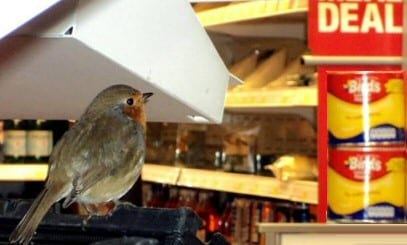
Co-op assistant Yvonne Benzie told us, ‘He cheers us all up. We will miss Robbie when he goes.’
*Probably the UK’s favorite bird, with its bright red breast it is familiar throughout the year and especially at Christmas. Males and females look identical, and young birds have no red breast and are spotted with golden brown.
Robins sing nearly all year round and despite their cute appearance, they are aggressively territorial and are quick to drive away intruders.
They will sing at night next to street lights.
After robin-themed funny animal stories, let’s focus on more funny animal stories reflected in pictures.
Amusing Pictures of Robins
Below, you will find funny animal stories about pigeons in pictures.
Migration Time
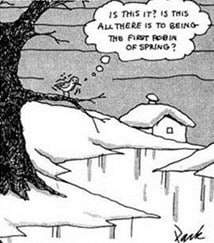
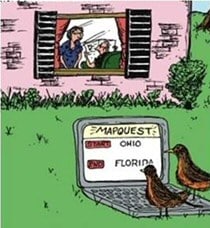
It always makes me melancholy when the robins start migrating south. So, instead of funny animal stories, the pictures above are sadder.
William Blake
‘A robin redbreast in a cage puts all heaven in a rage.’
In the poem “Auguries of Innocence”
Ducks Banned from a Village Pond Story
Next, let’s continue with funny animal stories on ducks.
Ducks Banned – Here is the female hen Mallard duck
Before introducing some duck-themed funny animal stories, let’s take a look at pictures.
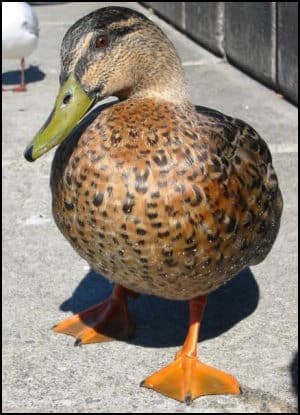
Here is her husband – the Drake
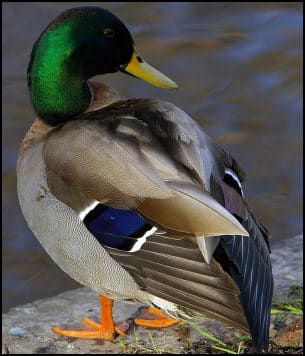
The drake has an iridescent green head and a blue band in his feather.
This is the Story of the Ducks’ Ban
And now, here are our favorite funny animal stories on ducks:
Ducks are to be banned from a village pond. The mallards have been branded a menace by officials because they are eating the frogspawn. The community council in Creigiau, near Cardiff, has ordered the birds to be relocated to another pond.
According to the Daily Express council secretary Alec Davies said, ‘There are almost no frogs, newts and stickleback in the pond this year. The ducks are destroying the habitat and we have made a decision to relocate them.’
Villagers are furious with the council’s plans. Local Andrew Wigley-Jones said, ‘My 3-year-old daughter loves going to see the ducks. They are part of the character of the village and bring the community together.’
An RSPB spokesman said, ‘There are lots of other reasons why frogspawn has been delayed this year, including the fact that it has been particularly cold. The main problem with ducks is that if you relocate them there is nothing to stop them from flying back.’
Doctors Go Duck Hunting
Five doctors went duck hunting one day. Included in the group were a general practitioner, a pediatrician, a psychiatrist, a surgeon, and a pathologist. After a time, a bird came winging overhead. The first to react was the general practitioner who raised his shotgun but then hesitated. ‘I’m not quite sure it’s a duck,’ he said, ‘I think that I will have to get a second opinion.’ Of course, by that time, the bird was long gone.
Another bird appeared in the sky soon after. This time, the pediatrician drew a bead on it. He too, however, was unsure if it was a duck in his sights, and besides, it might have babies. ‘I’ll have to do some more investigations,’ he muttered as the creature made good its escape.
Next to spy a bird flying was the sharp-eyed psychiatrist. Shotgun shouldered, he was more certain of his intended prey’s identity. ‘Now, I know it’s a duck, but does it know it’s a duck?’The fortunate bird disappeared while the fellow wrestled with this dilemma.
Finally, a fourth fowl sped past, and this time the surgeon’s weapon pointed skywards and he fired without hesitation. ‘BOOM.’ The surgeon lowered his smoking gun and turned nonchalantly to the pathologist beside him, ‘Go see if that was a duck, will you?’
Question: What do you call a duck that just doesn’t fit in?
Answer: Mallardjusted.
This is also among the best funny animal stories featuring ducks.
Funny animal Stories about Feeding Mallard Ducks
The following funny animal stories feature mallard ducks.
Let’s Go and Feed the Ducks…
Here is a true duck story. There is no punch line, no moral, just a captivating account of Pauline and Guy’s experience of Mallard ducks.
Neither my wife Pauline nor I are animal lovers. So one of our easiest prenuptial agreements was not to have pets. Mallard ducks are our sort of animal. They need no house room, we can
admire them for an hour, then ignore them until the next day. We can feed the ducks when we like. Should we miss a day, they can forage, or more likely, beg bread from another duck-loving softie.
This story captures the essence of funny animal stories.
Late Spring – Ducklings are Born
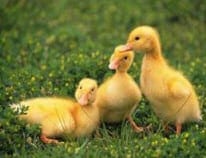
Let’s continue our funny animal stories with another duck tale. Our duck story begins around the end of May. Just down from our house, there is a sizeable pond. This particular spring there were three mother ducks, they had clutches of 5, 6, and 7 ducklings. In addition, there were three or four Aunts’. An Aunt is what we call the older female ducks, who have no chicks of their own, but nevertheless hang around the pond. At this time, the ‘ Daddy’ ducks – Guy word for drakes – flew off. A man with a dog said he thought they had flown to a nearby pond for sanctuary. We never knew for sure. Whatever, in about 6 weeks the ‘
Daddies returned to check out their Wives.
When the chicks were small, they would parade in crocodile fashion, their proud mother in the lead. In those early days, Pauline and I just admired the ducks as we walked by the side of the pond. We knew that neighbors’ children were giving the ducks bread. However, it wasn’t
until our nephews’ came to stay that we started feeding the ducks. Our first attempt to feed them was not a great success, they turned up their noses at the Cornflakes, (well they were ancient) however, the dead scones and old cake crumbs were acceptable.
Our nephews’ visit was over, but Pauline and I had the taste for feeding the ducks. We started by just throwing bread into the water. When the slices of bread were finished, and we had no more food to give, we set off for home. When we turned around the ducks came out of the water, and started following us pleadingly. Well it worked, I looked at Pauline, and in an instant, we both agreed that I should run back for fresh supplies.
When we went to feed the ducks, we threw the bread on the water. The ducklings would respond by paddling frantically, which caused their heads to move rapidly from side to side movement. This turbo-charged swimming meant the fluffy ducklings could race their parents
to the food. The aloof adults just cruised up sedately and were content with a few crumbs. Sometimes when we arrived at the edge of the pond there were no ducks. They were at the other end of the pond or were sleeping under the trees. As we walked towards them, we
heard the mother Jemima ‘quack’. It seemed silly, but devilment took over, and we ‘quacked’
too, this excited them and they ‘quacked’ back. Then suddenly the whole squadron of ducklings came paddling like fury towards us.
While Henrietta and Jemimah, the two older female ducks were identifiable from the other ducks, at first all the drakes seemed the same. Therefore, I called any drake a ‘Daddy’. You can distinguish the adult male drake from the female ducks by the male’s bright green heads and flashes of blue in their wings.
At first, the drakes were not interested in our food, either they were not hungry, or they just could not bother with the hurly-burly of the youngsters feeding. However, gradually these drakes muscled their way into the action. Pauline and I were alarmed by the way the Daddies picked up the chicks in their beak and flung them out of the way as if they thought the youngster was invading their feeding space. Nature in the raw we mused.
Summer Days
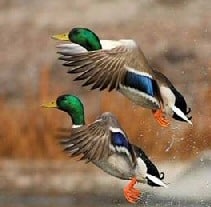
It was tranquil by the pond. Sometimes beloved Pauline and I would just sit on the seat and watch the animal life. The ducks would swim over, come out of the water, and then waddle over to us. We experimented with several feeding techniques. I favored tossing bread into each mouth in turn. If it was a good throw, the duck caught the bread in its beak; if I missed, there was a mad scramble. Pauline favoured lobbing a shower of pieces, so that lots of ducks could
feed at once, with less squabbling. Occasionally, Pauline gave out a huge piece, just to see a lucky duck waddle off into the bushes. Inevitably the triumph was short-lived as two or three other ducks chased after the victor and snatched chunks until the lump of bread was just crumbs.
Soon the 18 ducklings became one big happy gang. Four or five of the senior ducks disappeared. I expect these mothers and Aunts were worn out by their offspring. One surprise was that the ducklings were faster and more adept at getting the bread than their parents. While many of the ducklings could catch bread in their mouths, the parent ducks were less agile. Sight and coordination seem to fade quickly in the duck world.
In order to feed Henrietta and Jemimah we developed a special technique. We threw a large crumb so that one bounced and the bread landed at their feet. This gave Henrietta or Jemimah a head start, but it was not always enough as the nimble youngsters could nip in and get it before Jemimah could see it, bend, and collect the morsel. She would retaliate and peck lumps out of the interloper. On these occasions, she had our sympathy. We loved all the ducks and although tempted, we never laid a hand or boot on even the naughtiest. Instead, we relied on subtlety to get the feeding rations where they were most needed.
One wet day, when we were unable to go and feed the ducks, Pauline looked out of the window and was amazed to see a gaggle of our ducks on our lawn. They seemed to be saying, ‘We’re hungry’; ‘Please can you give us a snack’. Well of course, Pauline fed them in our garden, which is 80 yards from the pond and up a 30 ft bank.
If time was short, or it was raining, or just for fun, we would ‘quack’ the ducks from our bank. Jemima would ‘quack’ back from the far side of the pond, then all the Mallards would swim over to our end of the pond. When they reached the shore they waddled up the bank. Occasionally, an eager duck would fly at least part of the way up the bank. They ate heartily on the bank of our lawn but always had an eye out for danger. Any hint of peril and they would fly back down to the safety of the water.
Also at the pond, were a family of moorhens. Their red nodding beaks and jerky swimming style made them quite distinctive. The moorhens were timid compared with the ducks, and to our way of thinking, much less intelligent. When the moorhens were on their own, they ignored any bread that we threw near them. Pauline had a soft spot for the moorhens, and we made a game of trying to feed them. Strangely, when the ducks came to feed, the moorhens would swoop on the bread. It was as if they needed the ducks to show them that the bread was good to eat, only then would the moorhens forage. However, it was not as simple as that because the ducks would chase and try to force the moorhens to drop the bread. The moorhens had to quickly reach their hidey holes in the reeds, or lose their snack.
Hope you enjoy these funny animal stories so far. Next one is still among funny animal stories featuring ducks.
Dicky* Leg (*Dicky is English slang for unwell)
One day we were feeding the ducks as usual, when we noticed that one of the ducks was lying still in the grass. It was as if she was nesting, except she was the wrong age, it was the wrong season and the duck was sitting in an exposed position. On closer inspection, we could see that one of her legs was useless. Probably broken. Neither Pauline nor I are noted animal lovers, but our hearts went out to the duck. Luckily, ducks are truly amphibious and she could still swim into the water, and thus escape from marauding dogs.
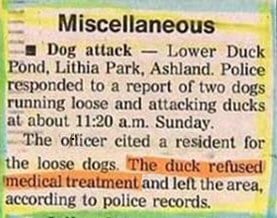
Pauline phoned the RSPB (Royal Society for the Protection of Birds), but there was no reply. Dicky Leg as we called the duck, was obviously in distress. We thought that its best chance was to make sure that it was well fed. We reasoned that if she had food, she would have the will to live. So we devised a plan where I distracted the majority of ducks, meanwhile Pauline fed Dicky Leg. Well, animals are cruel, and the other ducks attacked Dicky Leg and tried to take away her food. Rather than fight back she would just slink off. Therefore, my distraction tactics had to be improved. This time I ran 20 yds then threw a mass of bread for the hordes of ducks to fall upon. Now Pauline had the opportunity to feed Dicky Leg.
We feared for Dicky Leg’s survival. On the next day, it was with some trepidation that we went down to see the ducks. We were mightily relieved that Dicky Leg was no worse. After three days she could hobble on land with the others. Five days later she limped all the way up the 30 ft bank, this brought tears to Pauline’s eyes. Pauline made sure that Dicky Leg had a good meal each day, as a result, she grew bigger and was no longer the runt of the gang. As the weeks went by, the recovery was so complete that it was almost impossible to tell Dicky Leg from the other ducks.
Now let’s tell more funny animal stories about different seasons.
Autumn Days
In September the ducklings were as big, if not bigger, than their mothers. For some time Pauline and I had been wondering about the gender of the chicks. In the first weeks, they all looked similar and their coloring was just like their mothers. However, the Mallard ‘ Daddies’
all had magnificent green heads, and my beloved spotted they also had a white necklace marking. One day, out of the blue, or should it be out of the green, one of the chicks had a faint, but definite, green tinge about its eyes. Within a week 3 other chicks had developed the unmistakable Drake coloring. So from the 18 chicks, 4 boys and 6 girls grew up and 8 ducklings were lost.
One tranquil Indian summer day in October, we had finished feeding the ducks and were just sitting on the seat, admiring the evening. Most of the ducks had swum serenely back to the other end of the pond. However, two ducks lingered under the tree. They began dipping their beaks in the water. This was evidently a courtship ritual as their head nodding got
more intense, and rhythmical. Next, they stroked each other’s necks – literally necking. Suddenly, the drake mounted the duck. It was all over very quickly. We both commented on how unkind it was for the drake to hold the duck’s head under the water during mating. An ornithologist said on T.V. that the exceptionally warm Autumn makes the birds think it’s spring. Well, it certainly confused those two Mallards.
Winter
During the winter months, fewer people seemed to feed the ducks. So they roamed. We could see them flying off on day trips to all points of the compass, probably to nearby ponds. It’s
probably all part of their normal wanderlust behavior.
At this time a seagull came and settled on the lake. I must say there was something about the way it took the ducks’ bread that I did not like, and I do confess to throwing stones at it.
Something I would never do to the ducks.
When the snow came, like many animals, the ducks became extremely tame and came up into our front garden in search of food. We did not disappoint them.
Second Year
Our funny animal stories about duck continue into the second year. The onset of spring was marked by a profusion of willow catkins; the trees took on a gentle greedy yellow tinge. The ducks’ behavior, like all the rest of nature, took to courtship. Males and females paired up and swam around the pond together. There seemed to be four pairs. As time went on two of the girls seemed to hide away, I hoped they were nesting. One of the other girls – we called her Mary – had two suitors, Henry who sported the regular Mallard colors, and Edward who had white and brown genes. The ménage à trois were inseparable.
My own beloved, Pauline, read that it’s the female ducks who make the most noise. This
certainly rang true for Henrietta last summer. We could not help noticing that Edward was a very talkative duck, even if he did not generate the volume that Henrietta could. Whether it was his noisy behavior or his unusual coloring we are not sure, but whatever the reason, one or two of the other ‘Daddy’ ducks tried to mate with Edward.
Once or twice a week we saw the other female with her husband, we just hoped that they were making a nest and that she would lay a good clutch of eggs.
The evenings are drawing out now, and after supper, the ducks come right up to our house. We love feeding them by throwing bread through the window. Occasionally Blue Beak would try to get in on the act, Edward and Henry would see him off by dropping their beaks, extending their necks, and charging. Sometimes they would ruffle his tail feathers, but mostly the threat was enough.
Later in the summer, Blue Beak acquired a friend called Rodney, and now and then, another friend called Titch. It seemed that three Amigos, Mary Edward, and Henry got first choice of any food, thereby becoming noticeably fatter than the other ducks. When they had their fill of bread, they rewarded us by sitting still in a nesting position for hours. Pauline believes that Mary
is Dicky Leg, I agree that her gait shows a distinct limp.
In April a pair of Swans dropped in. The way they move on water is quite majestic. The pair take food and co-exist amicably with the ducks. One day they were gone. However in a few days one returned, My Mother says they mate for life, so we are hoping that the female is hidden in the shrubbery laying some eggs.
One day my darling Pauline and I went to the Ginny Ring Craft Centre. There we saw a marvelous picture of five or six ducks, we just had to buy the picture to remind us of our time feeding the ducks.
Funny Animal stories of the Gassed Budgie
The next part of our funny animal stories are dedicated to the gassed budgie.
Funny Story of the Gassed Budgie
This story goes back to the time when gas appliances in England were being converted from methane to natural gas. A friend of Trevor’s called Barney had a good job as a fitter of these replacement gas appliances. It was a lovely job because they were paid at piece rate. The more houses they could convert, the more they earned. Barney got faster and faster at his job.
He was an expert at unscrewing the old oven and boiler parts and then whipping in the new fittings. He was so good that he could even convert the appliances without turning off the gas at the mains. Now to pull off this trick Barney trained his breathing along the lines of those boys who dive for oysters. He would take a huge lungful of air, take off with the old fitting – O.K. so gas escapes, but he soon whacked in the new shiny joint and then gasped another breath from an open window. There was one other proviso for this risky shortcut,
the owner had to be out.
One day he knocked on the door and explained to the lady that he had come from the gas board about their North Sea conversion. The owner was delighted that she was finally going to move from the smelly old gas to the new natural gas. She told Barney that she just had to pop to the shops and as her husband was working in the garden, Barney could go ahead with his fitting. Great thought Barney, this will be a quick job, no need to turn off the gas at the mains. The boiler was no trouble, but one of the jets in the oven was rusty and crusted. Even though the gas was escaping, Barney sprayed a can of WD-40 on the obstinate fitting, and eventually it unscrewed and he whisked on the replacement part.
As Barney came up for air, to his horror, he spotted that the budgie in the kitchen was lying on its back at the bottom of his cage. It was not looking good, and to add to his trouble he could see the lady opening the gate at the bottom of the garden. What to do? Being resourceful, Barney cut a length of fuse wire wrapped it around the dead budgie’s
legs, and tethered him to his perch. As a nice touch, he even set the perch rocking, and then turned and met the lady in the doorway.’
All done
Barney said as he sauntered down the path to the gate.
‘My goodness’ said the lady, ‘my budgie’. Barney picked up the lady’s bad vibes and his chances of legging it were not improved by the sudden appearance of the woman’s husband
blocking his exit. ‘Come back here’ she said, and as his escape was cut off by the husband, he had no option but to turn and face the music.
‘It’s a miracle’, the lady said, ‘when I left this morning, my budgie was dead, now he’s jumped up on his perch and is swinging away happy as you please’.
Funny Animal stories on a fish
A customer at Stingray Fishmongers marveled at the owner’s quick wit and intelligence.
‘Tell me, Simon, what makes you so smart?’
‘I wouldn’t share my secret with just anyone, ‘Simon replies, lowering his voice so the other shoppers won’t hear.’ But since you’re a good and faithful customer, I’ll let you in on it. Fish heads. You eat enough of them, you’ll be positively brilliant.’
‘You sell them here?’ the customer asks.
‘Only $4 apiece’, says Simon.
The customer buys three. A week later, he’s back in the store complaining that the fish heads are disgusting and he isn’t any smarter.
‘You didn’t eat enough, ‘says Simon. The customer goes home with 20 more fish heads. Two weeks later, he’s back and this time he’s really angry.
‘Hey, Simon, ‘he complains, ‘you’re selling me fish heads for $4 a piece when I can buy the whole fish for $2. you’re ripping me off!’
‘You see?’ says Simon, ‘you’re smarter already.’
Strange but True Story of Hippo and Tortoise
Out funny animal stories continue with a strange but true story of a hippo.
The Hippo And The Tortoise
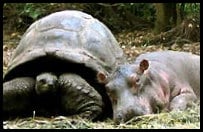
A baby hippo, which was rescued after floods in Kenya, has befriended a tortoise. The one-year-old hippo calf christened Owen was found dehydrated by wildlife rangers on the shores of
the Indian Ocean. Apparently, the rest of the Hippopotamus herd was washed out to sea.
Owen was put in an enclosure at a wildlife sanctuary in the coastal city of Mombasa, also in the enclosure was a male tortoise called Mzee. Notice that they are both of a similar color. (In Swahili, Mzee means old man).
‘They sleep together, eat together, and are inseparable, ‘reports park official Pauline Kimoti.’
Since Owen arrived on the 27 December, the tortoise behaves like a mother to it.’
Ms Kimoti said that if the 300kg hippo continued to thrive then in the next few weeks they would allow the public to see the unlikely pair together before they are separated.
Long term they hope to pair Owen with Cleo, a lonely female hippo who is currently in a separate enclosure.
Mzee and Owen are the latest in a series of unusual bondings in the wild that have surprised zoologists in Kenya. What a lovely story of a hippo and a tortoise.
Clive of India’s Tortoise
We wouldn’t miss turtles from our funny animal stories.
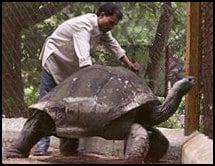
On 23rd of March 2006, a giant tortoise called ‘Addwaitya’ died in the Kolkata zoo in India. The tortoise had been the pet of Robert Clive (Clive of India), the famous British officer who did so much to establish India as a colony. Estimates suggest that this Aldabran tortoise called ‘Addwaitya’ was about 250 years old. Indeed ‘Addwaitya’ would have to be at least that age as Clive of India died in 1774.
The name ‘Addwaitya’ means ‘The One and Only in Bengali, it is claimed to be the oldest tortoise in the world, unfortunately, there are gaps in the provenance.
‘Historical records show he was a pet of British general Robert Clive of the East India Company and had spent several years in his sprawling estate before he was brought to the zoo about 130 years ago, ‘West Bengal Forest Minister Jogesh Barman said.
‘We have documents to prove that he was more than 150 years old, but we have pieced together other evidence like statements from authentic sources and it seems that he is more than 250 years old, ‘he said. The minister said details about Addwaitya’s early life showed that British sailors had brought him from the Seychelles islands and presented him to Clive.
Will and Guy hope that they will use carbon dating to confirm the age of Addwaitya. There are rumors that you can date tortoises by their rings. However, this is nowhere as accurate as tree ring dating. Because of the age and importance of Addwaitya, we hope they will find the necessary finds for carbon dating.
This breed of Aldabra tortoises is native to the Seychelles in general and to the island of Aldabra in particular. It is believed that tortoises are the longest-lived of all animals, it is not uncommon for them to reach their 100th birthday.
How to Find Your Lost Tortoise
As a part of reading funny animal stories, you should also read how to find lost turtles.
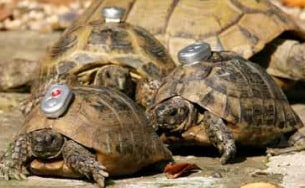
An animal lover was so fed up with looking for her tortoises that she fitted them with a tracker device. Jane Williams, who runs a tortoise sanctuary from her home in Colchester, uses a handheld scanner to hunt down her 60 animals, reports the East Anglian Daily Times. The tracker device is attached to their shells with a removable sticky pad.
Ms Williams said, ‘I think they are absolutely fantastic. Contrary to popular belief tortoises can actually move quite fast. They are real escape artists. They can climb walls, hide in bushes, and bury themselves. We find them in all sorts of unusual places. It is amazing how difficult it can be to find them.’
Interesting Facts About Tortoises
We also want to present some interesting facts as a part of our funny animal stories:
- Giant tortoises can weigh over 500 lbs. This makes some tortoises strong enough for humans to ride on their backs.
- Tortoises evolved over 200 million years ago and are relatively unchanged over time. Their success in adapting to the environment is probably due to the protective ability of their shell or carapace. This shell is made up of 60 bone-like plates.
- There are nearly 40 different species of tortoise The largest species of tortoise living today are found in the Galapagos islands, they can weigh up to 500lbs – try lifting that!
- If you see a whole gang, they can be referred to as a ‘creep’ of tortoises.
- It seems silly to even measure their speed when turtles are unlikely to move more than 100 meters in an hour. Hence a ‘creep of tortoises’ is not a bad collective noun.
- Good news: tortoises cannot stick their tongue out at you; yet surprisingly, they have good eyesight.
- You may recall the famous Aesop’s fable featuring the Tortoise and the Hare. Ever the boaster, the hare taunts the tortoise that he can race him. The hare rushes off into a lead, but then fools around and falls asleep. When the hare wakes he is just in time to see the plodding tortoise crossing the finishing line and winning their race.
Next, we’ll focus on funny animal stories on tortoises.
A Tortoise Races a Bear
A tortoise and bear met one spring day at a lake. A polar bear agreed to referee their race around the lake. While the bear took the land route, the tortoise dived through a hole in the ice. Then at the next hole, it appeared ahead of the bear. The bear who was so confident of winning that he was only loping along, began to run.
Then at the second hole, the turtle was still, ahead; as he was at the third, fifth, tenth, and finally the last hole. While the bear tried frantically to catch up with the tortoise he was totally out-paced. As referee the polar bear declared the tortoise had won the race, the seals cheered, and even the other bears clapped.
When everyone had gone home, the tortoise tapped three times on the ice. Up came his brothers, his sisters, and his cousins who had been manning the intervening holes in the ice. When the whole family emerged, the tortoise said, ‘We may be slow of foot, but we are not slow of wit’.
For now, let’s finish our funny animal stories on turtles for a while and talk about cats.
Cat Adopts Bird
A cat has adopted a bird that hurt itself when it fell out of its nest in Brazil and cannot fly.
The cat, called Chiquita, has reportedly raised the bird as if it were its mother in Porto Alegre, Brazil. They eat from the same plate and the cat even uses the bird to catch other birds to eat.
Chiquita’s owner, Nair de Souza, has named the bird Pitico, reports Zero Hora.
Mrs Souza said: ‘Pitico has even started to eat meat because the two of them only eat together. But Chiquita uses Pitico to help her catch other birds, it is really unbelievable!’
Strange But True. Dangerous Seagulls Story
Will and Guy’s collection of funny animal stories of seagulls on pictures.
Please Don’t Feed the Seagulls
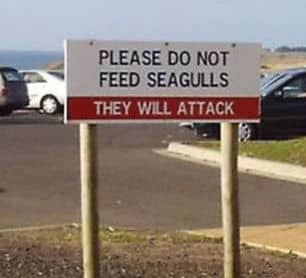
I wondered why anyone would put up a sign saying: Please Do Not Feed Seagulls. The answer is in an article from the South Devon newspaper the Herald Express. (See underneath the picture.)
Helmets Deflect Seagull Attacks
Workers at a Devon council have been issued with crash helmets – to protect them from dive-bombing seagulls. Flocks of seagulls have been attacking staff who collect weather data from the roof of council offices in Newton Abbot.
One victim, David Potter, said: ‘It can be really bad and it’s getting worse. It is my fourth year doing the job and there are more and more gulls. ‘The big gulls swoop at my head and are backed up by half a dozen others which scream and dive-bomb me.
‘It’s very distressing but at least we now have crash helmets to protect us from being pecked
about the head and face.’
The data is collected every day and is used by the Met Office as part of its national record-keeping and weather forecasting. A Teignbridge District Council spokesman said the helmets were issued as a security measure to staff. Reported in the local South Devon newspaper the Herald Express.
Footnote: While the seagull article from the Herald Express is genuine, I confess that the seagull photograph is taken elsewhere.
Sam Seagull
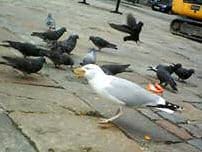
A pilfering seagull has turned shoplifter by wandering into a store and helping himself to his favorite crisps. The fearless bird lies in wait every day and pounces at a corner shop in Aberdeen, Scotland when the door opens. He sneaks in, grabs his spicy Doritos, then flies off with them in his beak and shares them with other birds.
The seagull, nicknamed Sam by staff and customers, has become so popular among locals
have started paying for his crisps.
Shop assistant Sriaram Nagarajan reported: ‘At first I didn’t believe a seagull was capable of stealing crisps. But I saw it with my own eyes and I was surprised. He’s very good at it. He’s becoming a bit of a celebrity. Seagulls are usually not that popular but Sam is a star because he’s so funny.
However, Please Note: It is Forbidden to Eat Seagulls
Before we move to next funny animal stories, there’s one note to make:
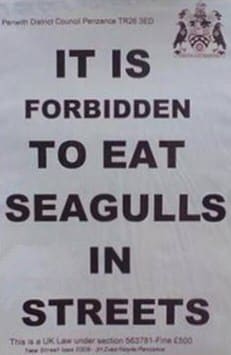
Not a Seagull – But a Raven
Some of the best funny animal stories on pictures:
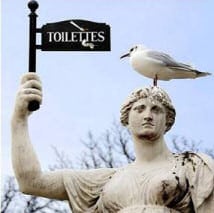
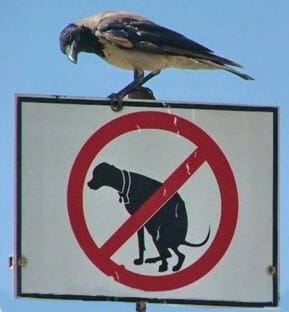
Well, He Had Been Warned!
And the result of those funny animal stories:
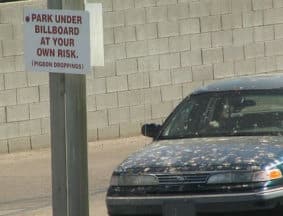
Park under the billboard at your own risk!
Dangerous Seagulls Spoil Playtime
Some schools in the town of Porec in Croatia are having to cancel outside playtimes because of aggressive seagulls. City officials have informed Will and Guy that several children had had their sandwiches stolen by these ‘dangerous’ birds.
‘It is too dangerous for school kids to go outside. We have to do something about the situation before it gets any worse,’ commented a spokesperson.
Treacherous Seagulls in England
Shoppers Warned about Seagulls Fish and chip shops in the seaside resort of Bridlington, Yorkshire, England have put up signs warning customers about being attacked by seagulls. Seafront chip shop owner Justin Carpenter told us he was now losing money because of the number of chip thefts. He said he was giving out more free bags of chips in compensation for the ones stolen by the birds.
Yorkshire Council said they were aware of the situation and warned tourists not to encourage the attacks by feeding the birds.
Another Dangerous Seagull Eats Man’s Ice Cream
Here are some of the best funny animal stories on seagulls:
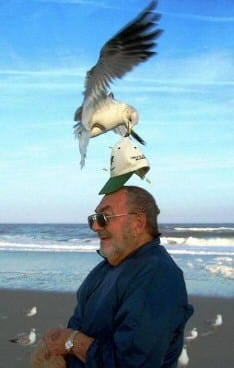
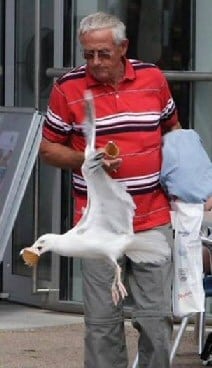
The Scottish Government Declares War on Seagulls
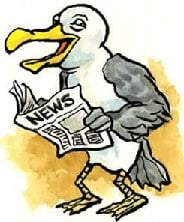
The councilors of Dumfries, Scotland are determined to do something about the seagull problem. Even though Dumfries is not on the coast they are plagued by seagulls, for example, ‘dive-bombing’ people and even disrupting paper boys delivering their daily newspapers. Enough is enough and next spring when the gulls breed, a special anti-gull ‘task force’ will seek and destroy the gulls’ nests and smash any eggs. The result should be a reduced seagull population in Dumfries.
“Seagulls are a menace to Scottish towns and cities,” said Environment Minister Michael Russell. “They thrive on litter and their aggressive behavior towards other birds, pets and even people is increasing.”
Dumfries town councilor Jack Groom said the time for talk was over, adding that it was time for action before a human was seriously hurt by the gulls. Will and Guy hope that other towns will take similar action to curb the seagull menace in as humane a way as possible.
Seagulls Start a Takeaway Business
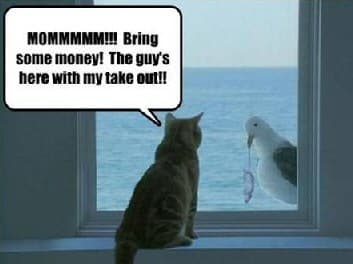
Funny Seagull Thinks He’s a Cat
After having some funny animal stories in pictures, let’s add the story itself as well:
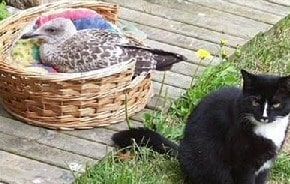
The seagull thinks it is a cat and often sleeps in its bed Will and Guy can reveal. [See photo]
After falling down a chimney and into a seaside home, “Mr. Pooh”, the seagull, became a very confused young bird. The herring gull was adopted by June and Steve Grimwood, who found him as a soot-covered baby in their fireplace – and now appears to believe he is actually a cat.
The couple brought him up with their cats, providing a basket from which he acquired a taste for Whiskas. Three years later, Mr Pooh has left the family home, but only as far as a nest on the roof with a female partner. He can’t resist returning three times a day for his favorite food, announcing his arrival by tapping on the door.
The bird eats the cats’ food with them out of a bowl
‘At first, the cats were quite wary of him but after a week they were eating out a bowl together. He’ll also often wander in and help himself to cat food. He also knows the sound of the fridge door opening and he’ll come in for that as well. He’s just like another pet in the family and even comes when he is called.’
Dangerous Seagull Spoils – Love Scene
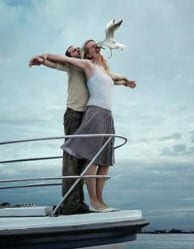
Original Scene with Kate Winslett and Leonardo DiCaprio
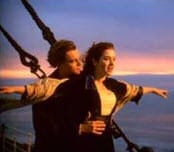
Interesting Facts About Seagulls
Again, after discussing funny animal stories about seagulls, we’ll provide some key facts again:
- While seagulls can be irritating to us humans, they are model parents where both the male and female take turns incubating the eggs and feeding the chicks. Moreover, if one parent is killed the other takes over and raises the chicks single-handed. Curiously, seagulls always lay two or three eggs in their nest. Finding four eggs in a seagull nest is as rare as a hen’s teeth.
- What makes gulls so successful, and so annoying is their ability to eat a wide range of food. Thus they follow fishing boats, hover around rubbish tips, they even steal food from other birds. If you ever get close to a gull, they always seem bigger than anticipated. Even the ‘Little Gull’ has a wingspan of about 2ft, whereas the largest Great Black-headed gull can have a wingspan of 5ft.
- Gulls are also successful in the sense that there are about 50 different species. Locals use the generic word ‘Seagull’ to describe any gull in their area. It is for this reason that scientists start with Linnaeus defined a Latin name to describe each type of animal and plant, for example, Larus argentatus (Herring Gull), or Larus ichthyaetus (Great Black-headed Gull).
- A seagull can drink both fresh and saltwater. To overcome problems of salt building up in their bodies, seagulls have a special pair of glands above their eyes, which flush salt from bodies through openings in the bill.
- How to make your fortune: invent a seagull scarer. Many have tried, but nobody has succeeded in frightening away seagulls. On a related matter some councils in the UK are reducing their town’s seagull population by sterilizing their eggs in boiling oil, then returning the infertile eggs to the nests.
More Funny Animal Stories
Next, we’ll discuss various funny animal stories.
Dormouse Speak
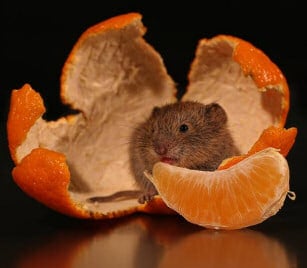
Mrs Dormouse was stealing food from the kitchen with her children, when Slats, the cat pounced. Encouraging her children to run, Mrs Dormouse shepherded them towards the mouse hole but it was obvious she wasn’t going to make it. In desperation, she turned to face Slats the cat and shouted ‘Bark, Bark’ extremely loudly Slats the cat skidded to a halt, turned, and ran away Mrs Dormouse turned to her children and said, ‘You see how important it is to learn a foreign language.’
- What has 12 legs, 6 eyes, and 3 tails but still cannot see?
- 3 Blind mice.
Clever Pooch Purchases His Own Sausages
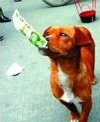
A dog owner in China says his pet is smart enough to buy himself sausages when he’s hungry. Wu Qianhe, of Chengdu City, in China, says his pooch, Lele, barks to let him know he’s feeling hungry. ‘I’ll drop him one yuan, and he takes the money in his mouth and runs to the neighboring shops, which all know him well,’ reports Qianhe.
Lele will not release the money until he’s been given the sausage, Will and Guy have established. This is one of the best funny animal stories to come from China.
Writing In Chinese Is Easy Says Sea Lion
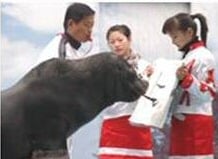
Zoo keepers have reportedly trained a sea lion to write in Chinese. Staff at the Ningbo Zoo, in Gao Qian Village in Dong Qian Lake Resort area, China, spent three months teaching the sea lion, called Peter, reports The People’s Daily.
Now Peter can write the Chinese character representing a “bull” and he can also sign his work with his own “sea lion” seal.
After completing his writing, Peter, a six-year-old male, holds the seal and stamps it on the paper as a signature, Will and Guy have established. The zoo has informed us that Peter will demonstrate his writing skills to tourists during the Spring Festival at the zoo.
Fabulous and Amazing Story of Monica Meerkat
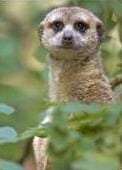
Jackie Morgan, a nurse from Mynydd Isa, near Mold, north Wales looked out at her garden and spotted a meerkat. Strange you may well think since the meerkat is found exclusively on the
semiarid plains of southern Africa. However, Will and Guy can vouch for the veracity of this story
Jackie Morgan says the African animal looked ‘rather sorry for itself, standing upright and shivering in the morning frost.’ So she, and Husband Keith, ‘phoned animal rescue centers, a vet, the Welsh Mountain Zoo, and Chester Zoo, but naturally no one believed them and most thought it a hoax and suggested it was probably a ferret. Mrs Morgan set about catching the meerkat which she, by then, had named Monica. ‘We put some nuts out for it so it came in and we captured it in a box and took some photos of it to send to the doubting authorities; they all phoned back saying it was most definitely a meerkat.’ She added, ‘We’ve had it sitting on our
laps and it followed me around everywhere – I think it thinks I’m it’s mum.’
Chester Zoo came to Monica Meerkat’s and Jackie’s rescue when it collected the animal before returning her to her rightful owner. Definitely one of the best funny animal stories!
“Park The Dog” – An Amusing Tale
Kerry pulled into a crowded parking lot and rolled down the car windows to make sure her Irish setter had sufficient fresh air when she went shopping.
The dog was stretched out on the back seat, and Kerry wanted to impress upon him that he must remain there. She walked to the curb backward, pointing her finger at the car and saying emphatically, ‘Now you stay. Do you hear me? Stay,’ in a very firm voice.
The driver of a nearby car gave Kerry a startled look. ‘I don’t know about you, lady,’ he said
incredulously. ‘But I usually just put my car in park.’
Funny Animal Stories on love
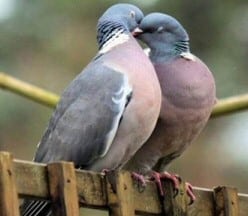
Will and Guy have searched the internet to find the most interesting and funny animal stories of love.
Tiger Cubs and Great Apes Find Love Together
Let’s start this part of funny animal stories with a fabulous, warm, and lovely story.
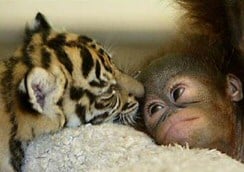
We have seen many lovely and funny animal stories where infant animals, which have been abandoned by their parents, link up with totally different species and make close, loving friendships. Here we have a pair of Sumatran tiger cubs and a set of young orang-utans, all abandoned at birth, and have become inseparable after sharing a room at an Indonesian zoo.
The four have lived side by side for a month without a hitch, although this goes against their natural instincts. Will and Guy learned that ‘This is unusual and would never happen in the wild,’ zookeeper Sri Suwarni commented, adding, ‘Like human babies, they only want to play.’
Sadly we also learned that the friendship is not destined to last as tigers start eating meat when they are three months old and will need to be separated from their new playmates.
Story of Loving Elephants
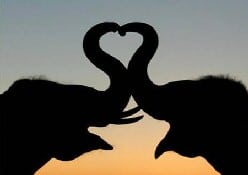
Loving elephants also deserve a special place among our funny animal stories.
When elephants retire, many head for the Elephant Sanctuary in Hohenwald, Tennessee, USA. They arrive one by one, but they tend to live out their lives two-by-two so Will and Guy have discovered.
‘Every elephant that comes here searches out someone that she then spends most all of her time with,’ sanctuary co-founder Carol Buckley has told us.
‘It’s like having a best girlfriend, Buckley says. Somebody they can relate to, they have something in common with.’
Debbie has Ronnie. Misty can’t live without Dulary. Those are pachyderm-pachyderm pairs.
Strangely the closest friends of all are Tarra and Bella. That would be Tarra the 8,700-pound Asian elephant and Bella the dog. ‘This is her friend,’ Buckley says, scratching Bella’s tummy. ‘Her friend just happens to be a dog and not an elephant. Bella knows she’s not an elephant. Tarra knows she’s not a dog,” Buckley adds. ‘But that’s not a problem for them.’
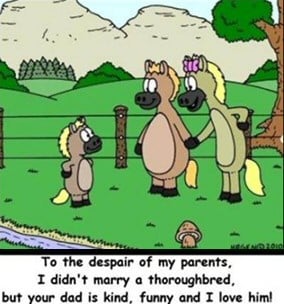
A Sad and Memorable Story of Two Love Birds
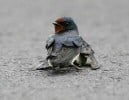
It is perhaps dangerous and unwise to credit the animal kingdom, in this case, birds, with human emotions. However, this sequence of photos brought to you by Will and Guy lend themselves to writing a short, sad, and pithy love story.
Here his mate is injured and her condition appears to be appalling.
In an attempt to revive her, he brings her food and attends to her with love and compassion.
Sadly he finds that despite bringing her food she has died to he attempts to move her.
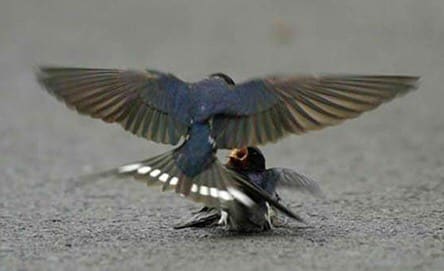
He stands beside her and calls out; saddened by her death.
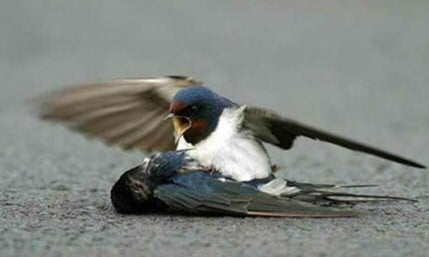
Finally aware that she would not return to him and she has departed he remains beside her body in sadness and sorrow.
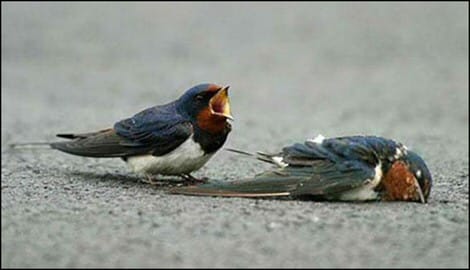
Will and Guy believe that the photographs showing this animal love story were taken in the Republic of Ukraine. We are unable to record the name of the photographer and would ask that he makes himself/herself known so we can add the name to our site.
We apologize if the photos offend our readers of funny animal stories.
A True Story Of Courage And Love
Now, let’s tell a true tale that can be classified among funny animal stories.
Walking down a path through some woods in Georgia, I saw a water puddle ahead on the path. I angled my direction to go around it on the part of the path that wasn’t covered by water and mud. As I reached the puddle, I was suddenly attacked! Yet I did nothing for the attack was so unpredictable and from a source so totally unexpected. I was startled as well as unhurt, despite having been struck four or five times already. I backed up a foot and my attacker stopped attacking me. Instead of attacking more, he hovered in the air on graceful butterfly wings in front of me. Had I been hurt I wouldn’t have found it amusing, but I was unhurt, it was funny, and I was laughing.
After all, I was being attacked by a butterfly!
Having stopped laughing, I took a step forward. My attacker rushed me again. He rammed me in the chest with his head and body, striking me over and over again with all his might, still to no avail. For a second time, I retreated a step while my attacker relented in his attack. Yet again, I tried moving forward. My attacker charged me again. I was rammed in the chest over and over again. I wasn’t sure what to do, other than to retreat a third time. After all, it’s just not every day that one is attacked by a butterfly. This time, though, I stepped back several paces to look the situation over. My attacker moved back as well to land on the ground. That’s when I discovered why my attacker was charging me only moments earlier. He had a mate and she was dying. She was beside the puddle where he landed.
Sitting close beside her, he opened and closed his wings as if to fan her. I could only admire the love and courage of that butterfly in his concern for his mate. He had taken it upon himself to attack me for his mate’s sake, even though she was clearly dying and I was so large. He did so just to give her those extra few precious moments of life, should I have been careless enough to step on her. Now I knew why and what he was fighting for. There was only one option left for me. I carefully made my way around the puddle to the other side of the path, though it was only inches wide and extremely muddy. His courage in attacking something thousands of times larger and heavier than himself just for his mate’s safety justified it. I couldn’t do anything other than reward him by walking on the more difficult side of the puddle. He had truly earned those moments to be with her, undisturbed.
I left them in peace for those last few moments, cleaning the mud from my boots when I later reached my car.
Since then, I’ve always tried to remember the courage of that butterfly whenever I see huge obstacles facing me. I use that butterfly’s courage as an inspiration and to remind myself that good things are worth fighting for.
Animal love story by David L. Kuzminski.
See another inspirational story of animal love.
An Ugly Duckling Story of Love
There once was an ugly duckling…………..a story of true love?
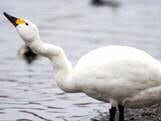
A male swan shunned by females because of his deformed neck may finally have found a girlfriend after seven years. ‘Crinkly’ the ugly swan became well-known at a bird sanctuary in Gloucester UK. Each winter he would fly in from Russia, and conservation workers and visitors have watched with dismay as Crinkly failed miserably to attract a mate. Experts at Slimbridge were amazed when Crinkly first arrived as a cygnet with parents Lucius and Coletta, with a strangely deformed neck probably caused by a birth defect.
‘We were worried about Crinkly because he is such a strange-looking bird,’ said Jools Mackin, spokesperson for Slimbridge Wildfowl and Wetlands Trust. Until now, none of the females at the sanctuary was prepared to mate with him but conservation workers say they can see signs of a budding romance.
‘We are delighted because we think Crinkly has finally found a girlfriend,’ commented Ms Mackin. ‘He appears to be loosely associating with another Slimbridge Bewick’s swan called Taciturn. It is too early to say whether or not they are mates.’
Funny Animal Stories on Bees
Let’s continue our funny animal stories with bees. There are plenty of funny animal stories about bees that you should know!
True Bee Story
Sniffer bees have been trained to detect bombs.
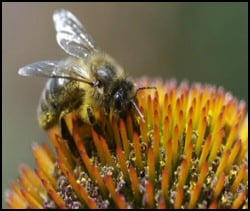
Sounds improbable but it’s true. Scientists have discovered that bees can be trained to detect scents far more quickly (and cheaply) than dogs. The bees are exposed to a particular smell and given a sugar reward. By repeating this process five or six times the bee always associates that smell with food so it sticks its proboscis (or tongue) out to receive it.
Trained bees are placed inside a hand-held detector. When they recognize a particular scent, like explosives or cocaine, they stick out their tongues and this response is recorded by computer software so the human handler can identify the source instantly.
The potential of bees is enormous. It may not be long before sniffer bees are a more familiar sight than sniffer dogs.
DARPA, America’s sci-fi Defence Advanced Research Projects Agency, has a billion-dollar-a-year budget and sponsors ‘off-the-wall’ ideas like bee bomb detectors that could prove winners in the fight against terrorists.
How Not to Get Rid of a Bee Hive
Continuing our funny animal stories with intriguing plots.
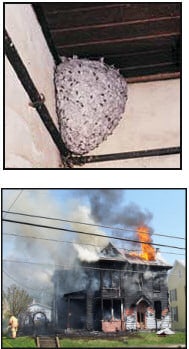
Mr. Joshua Mullen from Mobile, Alabama, USA is this month’s candidate for ‘Loser of the Month’. Finding that his shed had a nest of bees living in it you will find it hard to believe how he attempted to get rid of them.
Mr Mullen soaked some towels in gasoline [petrol] and placed them carefully in the shed in order to remove the bees. However, the shed erupted in flames with a loud ‘whoosh’. It appears that the fire started when the pilot light of a hot-water heater in the shed ignited fumes from the petrol.
The picture to the right is not of the actual blaze in Mobile: The fire caused some $80,000 worth of damage but luckily nobody was hurt in the conflagration. We have heard that Mr Mullen told reporters, ‘Looking at all this, there might have been a better way. It was a mistake. I wish I hadn’t done it, but I did.’
However, we can report that it did rid the shed of the bees!
Interesting Snippet
More people die in the USA each year from bee and wasp stings than from snake bites.
Mischievous Bee Story
A young man starts a new job at the zoo and is given three tasks.
First, he has to clean out the tropical fish tank. As he does this, a piranha jumps out and bites him. In a panic, he beats it to death with a spade. Realizing his employer will be cross with him, he disposes of the fish by feeding it to the lions, because lions eat anything.
On his second job of cleaning out the primate house, he is attacked by two aggressive chimpanzees, who pelt him with coconuts. He swipes wildly at the two chimps with his spade, killing them both. What can he do? Feed them to the lions, of course, because lions eat anything.
Finally, he has to collect honey from the South American bees. As soon as he starts, he is attacked by an angry swarm. He grabs the spade and smashes several of them to a pulp. He throws them into the lion enclosure because lions eat anything. Later that day a new lion arrives at the zoo. He wanders up to an old lion and asks, “What’s the food like here?”
Cheeky Bee Story
A man was driving down the road and ran out of gas. Just at that moment, a bee flew in his window. The bee said, “What seems to be the problem?” “I’m out of gas,” the man replied.
The bee told the man to wait right there and flew away. Minutes later, the man watched as an entire swarm of bees flew to his car and into his gas tank. After a few minutes, the bees flew out. “Try it now,” said one bee.
The man turned the ignition key and the car started right up. “Wow!” the man exclaimed, “What did you put in my gas tank”? The bee answered:

Funny animal Stories on a Bee
Did you know that a collection of bears was a ‘Sleuth’?
Yes, that’s one of the best funny animal stories today.
I’m Gonna be a bear
In this life, I’m a woman. In my next life, I’d like to come back as a bear. When you’re a
bear, you get to hibernate. You do nothing but sleep for six months. I could deal with that. Before you hibernate, you’re supposed to eat yourself stupid. I could deal with that too.

When you’re a girl bear, you birth your children (who are the size of walnuts) while you are sleeping and wake to partially grown, cute, cuddly cubs. I could definitely deal with that.
If you’re a mama bear, everyone knows you mean business. You swat anyone who bothers your cubs. If your cubs get out of line, you swat them too. I could deal with that.
If you’re a bear, your mate EXPECTS you to wake up growling. He EXPECTS that you will have hairy legs and excess body fat.
Yup, I’m gonna be a bear!
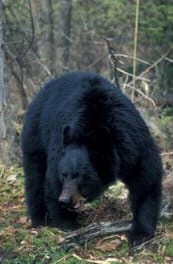
Bear Shocks Patients
Patients at a medical clinic were shocked to see a new patient one Friday morning when a hungry, young black bear walked in through an automatic door without disturbing anyone.
The 125-pound male bear who was probably hungry from a winter of hibernation, wandered into the Presbyterian Medical Group gastroenterology laboratory, a relatively small building off one the main roads in Rio Rancho, north of Albuquerque, New Mexico, USA, in the early morning hours.
Bears Lose Frisbee
Bears are nosey animals, but this time we think they’re working together to find their lost frisbee, as represented on this picture of our funny animal stories:
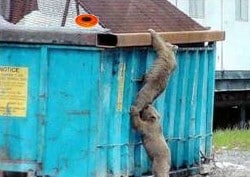
Naughty Bears
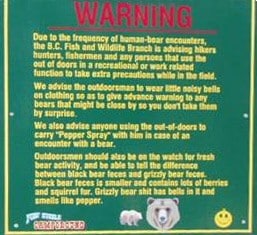
In light of the rising frequency of human/grizzly bear conflicts, the Montana Department of Fish and Game is advising hikers, hunters, and fishermen to take extra precautions and keep alert for bears while in the field.
We advise that outdoorsmen wear noisy little bells on their clothing so as not to startle bears that aren’t expecting them. We also advise outdoorsmen to carry pepper spray with them in case of an encounter with a bear. It is also a good idea to watch out for fresh signs of bear activity. Outdoorsmen should recognize the difference between black bear and grizzly bear poop. Black bear poop is smaller and contains lots of berries and squirrel fur. Grizzly bear poop is larger and has little bells in it and smells like pepper.
Funny animal stories on Grizzly Bears
Two guys were walking in the woods one day when they came across a bear. The bear noticed them and started growling and generally getting mean. It started to chase one of the guys, who, as it turns out, was from Czechoslovakia. Unfortunately, the bear soon caught up with him and ate him alive.
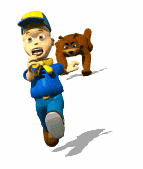
Meanwhile, the other guy turned around and ran for his life. A little while later, the second guy found a park ranger station and told his story. The ranger took his gun, and they both went out in search of the bear, in order to destroy it.
Soon, they came across two bears, one male, and one female. The ranger turned to the other guy and said, ‘Quick… tell me which bear ate your friend!’
The ranger leveled his gun and got ready to shoot. ‘I’m not really sure,’ said the other guy, ‘they both look so similar.’
‘QUICK! Make up your mind!’ demanded the ranger. ‘O.K.,’ said the other, ‘it was the male.’
The ranger promptly aimed and shot the female bear. The male ran off. Using his knife, the
ranger cut open the belly of the female and found the body of the other man.
‘But why didn’t you shoot the male when I thought it was the male who ate my friend?’ the other man asked.
Well,’ said the ranger… ‘I never trust anyone who says that the Czech’s in the male!’
More Funny Animal Stories on Bears
Let’s continue our funny animal stories with more bear pictures.
Come and join me – but please bring your picnic!
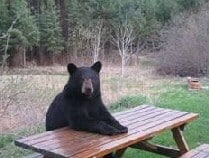
Two backpackers, Ted and his mate John were tramping through the woods when, to their horror, they saw a large ferocious-looking bear sitting at the picnic table they had chosen on which to eat their lunch. Ted, although dismayed, immediately removes his heavy hiking boots and starts to put on his running shoes.
John, equally concerned, calls out, ‘Hey, Ted. You’re wasting your time. You’ll never outrun that bear, so why are you putting those on?’
‘Aha,’ replies Ted quickly, ‘You see, John, I don’t have to outrun the bear, I only have to outrun you.’
Oh dear:
A bear walks into a bar and demands, ‘I want a large rum and……………………… a coke.
‘George, the barman enquires, ‘What’s with the huge pause?’
The bear answers, ‘Oh, them, I’ve had them all my life.’
Bear Encounter
A middle school teacher, from Missoula, Montana, USA, suffered bruising to his ribs, and his ego and received a large scratch on his back after he rode into a black bear while cycling to school earlier this week. Mr Jim Litz said he was traveling about 25 mph when he came upon a rise and spotted a black bear about 10 feet in front of him. He didn’t have time to stop and drove into the animal.
Will and Guy have learned that he then tumbled over the handlebars; whereby his helmet hit the bear’s back and the two went cartwheeling down the road. The bear rolled over Litz’s head, cracking his helmet, and scratching his back before quickly scarpering away up a hill above the road.
Fortunately for Mr Litz, his wife drove by shortly after the crash and was able to take her husband to hospital. We believe that he will be able to return to teaching science at Target Range Middle School by the end of this week.
Holiday Bear Has Fun
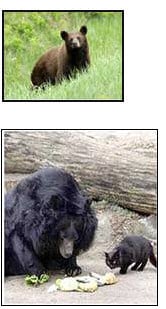
Guests staying at the Best Western Twin Peaks Motel in Ouray, Colorado, USA, received a shock when a cute, little cinnamon bear’ strolled into the hotel grounds and climbed into the swimming pool with them.
The motel manager informed us that the bear appeared to enjoy its dip and was no danger to the other guests; apparently, it is not uncommon for bears to wander across the motel’s grounds as it borders on the wilderness.
Berlin Zoo Bear Makes a Friend
An association between an Asian black bear and a cat is still bearing up well after seven years and has blossomed into a lifelong friendship Will and Guy have discovered. The pair have been friends since Muschi the cat strolled into Mausi the bear’s enclosure at Berlin Zoo, Germany, in 2001. We have learned that the black bear had been suffering from depression prior to meeting up with the friendly black feline.
The zoo’s caretaker, Thomas Dvrflein, added, ‘Muschi entered the enclosure of Mausi nearly seven years ago and started to eat the food in the enclosure. She was accepted straight away and they have been inseparable ever since, sharing food, cuddling, and spending their days together.’
Listen: Do Not Feed The Bears
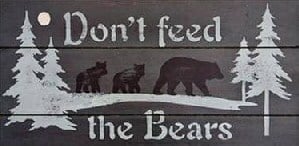
A visitor to a zoo, who was worse for wear from drinking too much alcohol, was badly injured trying to hand-feed a caged bear. The rather silly man from Shandong Province was freed from the bear’s grasp after keepers rushed to help.
Zoo officials indicated to Will and Guy that the man’s actions were foolish in the extreme. He had apparently ignored warning signs instructing him not to feed the animals or reach into their cages.
‘If you ignore the safety warnings, you must take full responsibility for the consequences,’ a zoo official told us. You couldn’t make it up.
Hunter finds first wild ‘Polargrizz’
A DNA test on a bear has confirmed what Inuit trackers in the far northern of Canada have claimed for years; namely the first proven case of a cross between a grizzly, Ursus arctos, and polar bear, Ursus maritimus in the wild.
Roger Kuptana, an Inuit tracker from the Northwest Territories, suspected the American hunter he was guiding had shot a hybrid bear after noticing its white fur was spotted brown and it had long claws and slightly humped back of a grizzly
Tests confirmed that a bear killed by a US hunter in Canada’s far north last month was the first Grizzly-Polar bear cross ever discovered in the wild.
‘It actually is a hybrid, ‘Judy McLinton, a spokeswoman for the Northwest Territories
environment and natural resources department in Yellowknife said.
Jim Martell, 65, who paid $A58,400 to hunt Polar bears, shot the animal on April 16. The
the creature has been described by local media as a ‘pizzly’, a ‘grolar bear’, and – Mr. Martell’s
favorite – a ‘polargrizz’.
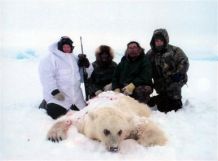
The Idaho native told The National Post, ‘Everybody thought it was a Polar bear, and
then they started looking more and more and they saw other features that resembled some of a Grizzly as well.’
The bear had thick, creamy white fur, typical of Polar bears, but its long claws, humped back
and shallow face, as well as brown patches around its eyes, nose, back, and on one foot, are Grizzly traits.
Geneticists have linked the two species. They believe Grizzly bears ventured north some 250,000 years ago to hunt seals and that their fur turned white over time.
Thus, the Polar bear was born. Odd couples have produced mixed offspring in captivity. But this is the first discovery of this mixed breed in the wild. The two species mate at different times of the year and inhabit vastly different regions – one lives on Arctic ice floes, the other in forests. But hunters have reported seeing Grizzlies further north in recent years as the Arctic warms. A laboratory in western Canada examined the bear’s DNA to make the determination.
- Geneticists have linked the two species. They believe Grizzly bears ventured north some 250,000 ago to hunt seals and that their fur turned white over time.
Interesting Facts About Bears
- One of the most curious collective nouns is a ‘sleuth of bears’. Will and Guy cannot immediately see the connection between tracking and a group of bears. We wonder what they could be seeking, tracking, or discovering.
- Statistically, more people are killed by lightning strikes than by grizzly bears. Taking the USA as an example, although deaths by bears attacking people are on the increase, they account for no more than 4 deaths per year compared with about 70 for lightning. In the UK, on average 3 people each year are killed by lightning, but none by bears.
- The term ‘bear’ is correctly applied to at least five completely different species. To distinguish between these different bears, we need an adjective or epithet. There is the North American grizzly bear, Ursus arctos, and its close relative the polar bear, Ursus maritimus. Then there is the panda (bear), Ailuropoda melanoleuca, and also the Asiatic
black bear, Selenarctos thibetanus. If you visit South America you may be fortunate and see the spectacled bear, Tremarctos Ornatus. Finally, in India, there is the sloth, which is really a bear called, Melursus ursinus. The Koala bear is of course a marsupial. - The male bear is called the boar, and the female the sow, their offspring are called
are cubs. - The brown bear eats a lot of fish, this is one of the reasons that it’s the largest land carnivore. If you are ever confronted by a brown bear, you better out-smart it because
bears run faster than you can. - Surprisingly, acorns are one of the black bear’s favorite foods. As soon as a bear has fattened up, it starts spying on the land for a suitable hideaway to hibernate.
- In the autumn bears eat all that they can to put on weight for the long winter’s hibernation. An average woman eats about 1,600 calories a day. Whereas a female bear scoffs 15,000 calories per day. Naturally bears drink a great deal to wash down all this food.
Funny Animal Stories on Elephants
Now, we’ll discuss more funny animal stories about elephants.
Differences Between African and Indian Elephants
The African elephants (Loxodonta africana) are the ones with the bigger ears. In fact, African elephants are also taller and heavier than their Indian cousins (Elephas maximus). A large African elephant could be 12ft at the shoulder and weigh 8 tons. Mostly elephants amble serenely at human walking speed, but in a stampede, they could reach 25 mph, which is faster than an Olympic sprinter.
They say an elephant never forgets. This is also good news for other elephants and they care for members of their family if they become ill or injured by poachers.
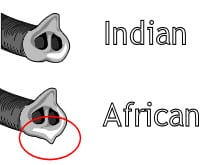
In African elephants, both males and females have enlarged incisors which develop into the famous tusks. Whereas, in Indian elephants, tusks development is much greater in males than females. Confusingly, some Indian male elephants don’t develop tusks, thus you cannot rely on the presence of tusks to determine the gender of an Indian elephant.
Another difference is in the shape of the back, the African elephants dip, and you could imagine a gigantic saddle fitting on their back. The Indian elephant on the other hand has a level or slightly convex back, saddling would be more difficult.
If you get a close look at the trunk, the Indian elephant has only one ‘finger’ at the end of its trunk, whereas the African elephant has two lips or fingers. The picture to the right also illustrates how the trunk is really an extension of the nose. While you cannot see the tips of the trunks in our pictures, you should be able to see from the ears that the ‘Polo elephant’ is Indian, while ‘Five’ in the painting elephant has to be African.
It’s also worth checking the toes on the hind feet. Both African and Indian elephants have five toes on the forelegs, so that does not help discriminate. However, the hind legs may reveal a
difference. Only three toes are a strong indicator of an African elephant, while five toes would almost certainly mean an Indian elephant.
That leaves the situation where you see four toes on the hind legs, most likely this is an Asian elephant.
The Story of Elephant Painting
Firstly, Five is an unusual name, especially for an African Elephant. Secondly, Five has come up with an unusual use for her trunk – she uses it to paint!
With help from her keeper, Five has painted more than 50 works of art. Painting experts
even think that her unique contemporary style is worthy of an exhibition exhibition. Even better, her masterpieces are in demand and you could buy one at the West Midland Safari Park in Bewdley, Worcestershire.
Back to that strange name, Five was one of three African Elephants that were brought to England from an elephant orphanage in South Africa – when she was five years old. That was back in 1998, thus she is 14 going on 15 in 2007. Elephant ages and maturity are not unlike humans, thus Five would now be considered a teenager in the elephant world.
Interesting Facts About Elephants
- A group of elephants can be called a ‘memory of elephants’, although a herd is a more common collective noun. On a related theme, elephants follow cattle in that the females, males, and offspring are called, cows, bulls, and calves respectively.
- The elephant’s memory is legendary, what is not so well known is they have a special ceremony for greeting a long-lost member of the herd. In this greeting ceremony, both elephants flap their ears, trumpet, and generally express joy.
- It would be easy to be fooled into thinking that elephants drink through their trunks; in fact, they use the trunk as a funnel to collect water, but then pour it into their mouth. Sometimes elephants choose to spray themselves with the water rather than drinking it. Incidentally, there are no bones in an elephant’s trunk.
- An elephant detective could track an elephant by following their individual footprints. What would help such stalking is the elephant’s habit of using the same paths as their ancestors.
- Elephants display ‘right-handedness’, not in their limbs, but in their tusks. Close examination of an elephant’s tusks will reveal that one tusk has a blunter tip and is thicker than its less favored counterpart. The reason for this difference is that in their natural habitat elephants use their tusk(s) for gathering food and digging for water. Consequently, the tusk on their favorite becomes more developed but blunter.
- Elephant’s ivory poses a terrible dilemma, it’s a wonderful and versatile material, but the fact that tusks are so valuable encourages poaching. It seems particularly obscene to think of such a noble, sensitive, joyous animal suffering at the hands of barbaric poachers.
All that Will and Guy can do about it is not to buy anything made of ivory. - The gestation period of mammals is in proportion to their size. Thus, pregnancy in mice lasts about 21 days, whereas in elephants it takes over 21 months.
- March 13th is National Thai Elephant Day. While September 22nd is Elephant Appreciation Day.
Funny animal Stories on Owls
The next animal on our list of funny animal stories is an owl.
Allegedly a True Owl Story Told to Will by Christine Green
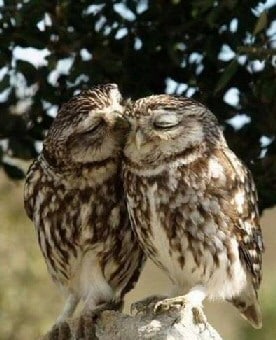
Each evening bird lover Tom Rowe stood in his backyard in Devon, England, hooting like an owl – and one night, an owl called back to him.
For a year, the man and his feathered friend hooted back and forth. Rowe even kept a log of the ‘conversation.’ Just as Rowe thought he was on the verge of a breakthrough in inter-species communication, his wife had a chat with the next-door neighbor, Nancy Hollis.
‘My husband spends his nights … calling out to owls,’ laughed Mrs. Rowe.
‘That’s odd,’ Mrs. Hollis replied. ‘So does my John.’
Then it dawned on them!
The Owl and the Pussycat Poem by Edward Lear
The Owl and the Pussycat went to sea In a beautiful pea-green boat,
They took some honey, and plenty of money,
Wrapped up in a five-pound note.
The Owl looked up to the stars above,
And sang to a small guitar,
“O lovely Pussy! O Pussy, my love,
What a beautiful Pussy you are,
You are, You are What a beautiful Pussy you are.”
Pussy said to the Owl “You elegant fowl,
How charmingly sweet you sing.
O let us be married, too long we have tarried;
But what shall we do for a ring?”
They sailed away, for a year and a day,
To the land where the Bong tree grows,
And there in a wood, a Piggy-wig stood
With a ring at the end of his nose,
His nose, His nose,
With a ring at the end of his nose.
“Dear Pig, are you willing to sell for one shilling your ring?”
Said the Piggy, “I will”
So they took it away and were married the next day
By the Turkey who lives on the hill.
They dined on mince, and slices of quince,
Which they ate with a runcible spoon.
And hand in hand, on the edge of the sand.
They danced by the light of the moon,
The moon, The moon,
They danced by the light of the moon.
Funny, Laid Back Tawny Owl – Thinks He’s Human
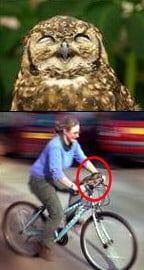
Treacle the Owl goes for a bike ride. Hand-reared owls can think that they are, in fact, human. Treacle, a six-year-old tawny owl brought up by his keeper, Jenny Smith in Eccleshall, Staffordshire, UK, is one such bird. Jenny has let Will and Guy know that because he is a rather lazy and laid-back owl she allowed him to ride on the handlebars of her bike.
M/S Smith commented, ‘I think Treacle likes being on the bike because owls are notoriously lazy. So this way he doesn’t have to do any exercise and he can sit around and look at his surrounding area to see what’s going on. We do fly him and he does enjoy flying but I suppose the bike feels like he’s flying but without putting in the effort.’
We have discovered that the Gentleshaw Wildlife Centre, where Treacle lives, also has a monkey that likes scribbling and a hawk that only likes women.
Eagle Owl

Following the extremely hot weather experienced in southern England here is Billy, a 16-year-old Eagle Owl, based in Hampshire, being sprayed with water from a hose to keep cool.
The funny owl picture to the right shows Billy’s expression at being sprayed.
Owls’ Natural History
Owls are an order of birds of prey. Most are solitary and nocturnal. Owls mostly hunt small mammals, insects, and other birds, though a few species specialize in hunting fish. They are found in all regions of the Earth except Antarctica, most of Greenland, and some remote
Funny Fishy Tales
1. What do You Do in Your Spare Time?
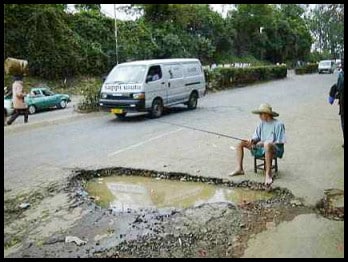
2) A Fish Tale
Name three fish beginning and ending in the letter ‘k’
- Killer shark
- Kwik-save frozen Haddock
- Kilmarnock
[Kilmarnock is a plaice in Scotland!]
Guy says: The above is one of those jokes that makes you cringe, but you cannot get it out of your mind. Kindly sent in by Martin Williams and his grandson.
3) The Ones That Got Away
After a Tuesday fishing on the River Test, near Southampton in Southern England, Trevor is walking from the pier carrying two brown trout in a bucket.
He is approached by a Water Conservation Officer who asks him for his fishing license.
Trevor replies to the environmentalist, ‘I was not fishing and I did not catch these brown trout, they are my pets. Every day I come down to the water and put these fish into the water and take them for a walk to the end of the pier and back. When I’m ready to go I whistle and they jump back into the bucket and we go home.
The officer, obviously, does not believe him and he reminds Trevor that it is illegal to fish without a license. The fisherman turns to the warden and says, ‘If you don’t believe me then watch, ‘and he throws the trout back into the water.
The warden says, ‘Now whistle to your fish and show me that they will jump out of the water and into the bucket.’
The fisherman turns to the officer and says, ‘What fish?’
4) Learning to Fish
Mrs Baker wanted to go ice fishing. She had read several books on the subject, and finally, after getting all the necessary equipment together, she made her way out onto the ice.
After positioning her comfy stool, she started to make a circular cut in the ice.
Frighteningly, from up above, a voice boomed, ‘There are no fish under the ice.’ Startled, Mrs Baker moved farther down the ice, poured herself a large coffee, and began to cut yet another hole.
Again, from the heavens, the voice bellowed, ‘There are no fish under the ice.’
Mrs Baker now became very concerned so she moved way down to the opposite end of the ice, set up her stool, and began again to cut her ice-hole.
The voice rang out once more, ‘There are no fish under the ice.’ Mrs Baker, stopped, looked upwards, and said, ‘Is that you, Lord?’
The voice replied, ‘No, this is the Ice-Rink Manager.’
5) Fishy Tale?
Give a man a fish, and he’ll eat for a day. Give a fish a man, and he’ll eat for weeks!
Toshihiro Kawabata
Funny Animal Stories on Birds
Below, there are funny animal stories on various cute animals.
Elvis has a New Pair of Blue Shoes
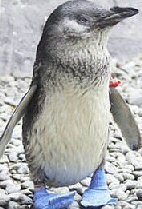
While they are not suede, they will keep the little blue penguin’s feet dry and infection-free. Elvis and 16 other little blues who arrived at the International Antarctic Centre in September have been given specially designed shoes after several penguins developed sore feet in their new home. Brought from Napier’s Marineland to take center stage at the Antarctic Centre’s Penguin Encounter display, the penguins are “second-chance” birds. Many have disabilities due to injuries.
Antarctic Centre director Richard Benton said some of the penguins had developed sore feet, which had proved “tricky” to treat. Veterinarian Pauline Howard had suggested rubber shoes. Snugly tailored, with a springy sole, the shoes are available in kelp green or penguin blue – to complement any penguin tuxedo.
Another True Bird Short Story
Hen Pecked Bird Gets His Own Back
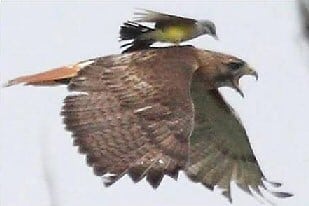
Photographed here is the moment a tiny but very angry *Kingbird hitched a piggyback ride on a red-tail hawk. The feisty flyer began attacking the bird of prey after it ventured too near its nest. Pat Gaines, 41, captured the amazing moment at Bonny Lake Park in Colorado, USA. ‘I’ve never seen a hawk harassed so much. The Kingbird pecked at its head as the hawk flew away screaming,’ she informed Will and Guy.
* The genus Tyrannus is a group of large insect-eating birds in the Tyrant flycatcher family Tyrannidae. The majority are named as Kingbirds. They prefer semi-open or open areas. These birds wait on an exposed perch and then catch insects in flight. They have long pointed wings and large broad bills. These birds tend to defend their breeding territories aggressively, often chasing away much larger birds as we can see from the story, above. The name of this genus means “tyrant”.
Sam Seagull – Bird Short Story
A pilfering seagull has turned shoplifter by wandering into a store and helping himself to his favorite crisps. The fearless bird lies in wait every day and pounces at a corner shop in Aberdeen, Scotland when the door opens. He sneaks in, grabs his spicy Doritos, then flies off with them in his beak and shares them with other birds.
The seagull, nicknamed Sam by staff and customers, has become so popular locals have started paying for his crisps.
Shop assistant Sriaram Nagarajan reported: ‘At first I didn’t believe a seagull was capable of stealing crisps. But I saw it with my own eyes and I was surprised. He’s very good at it. He’s becoming a bit of a celebrity. Seagulls are usually not that popular but Sam is a star because he’s so funny.’
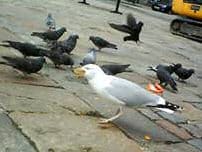
See the picture above, Sam Seagull and his pals eating
Amusing Alex, The Barman, and The Ostrich
Alex walks into Buck’s Bar with an ostrich behind him, and as he sits down, Buck, the barman, comes over and takes their order.
Alex says, ‘I’ll have a beer,’ and turns to the ostrich. ‘What’s yours?’
‘I’ll have a beer also,’ replies the ostrich.
The bartender pours the beer and says, ‘That will be £4.60 please.’
Alex reaches into his pocket and pulls out the exact change for payment.
The next day, Alex and the ostrich go to Buck’s Bar again, ‘I’ll have a beer,’
The ostrich says, ‘I’ll have the same.’
Once again the man reaches into his pocket and pays with the exact change.
This becomes a routine until, late one evening, the two enter again. ‘The usual?’ asks the barman ‘Well, it’s close to last orders, so I’ll have a large scotch,’ asks Alex.
‘Same for me,’ says the ostrich.
‘That will be £6.45,’ says Buck. Once again the man pulls the exact change out of his pocket and places it on the bar The bartender can’t hold back his curiosity any longer. ‘Excuse me, sir. How do you manage to always come up with the exact change out of your pocket every time?’
‘Well,’ answers Alex genially, ‘several years ago I was cleaning the attic and found an old lamp. When I rubbed it a Genie appeared and offered me two wishes. My first wish was that if I ever had to pay for anything, I just put my hand in my pocket, and the right amount of money will always be there.’
‘That’s brilliant!’ retorts the Buck, warming to the subject. ‘Most people would wish for a million dollars or something, but you’ll always be as rich as you want for as long as you live.’
‘That’s right. Whether it’s a gallon of milk or a Rolls Royce, the exact money is always there,’ comments Alex.
The barman then asks, ‘One other thing, sir, what’s with the ostrich?’
Alex replies, ‘Oh, my second wish was for a chick with long legs!’
Funny Daft Duck Story
Darnay Duck walks into a pub and orders a pint of lager and a ham sandwich. The landlord looks at him and exclaims, ‘But you’re a duck!’
‘Your eyes work,’ replies the Darnay Duck, wryly.
‘And you talk.’ splutters the landlord.
‘And your ears,’ continues Darnay Duck, ‘Now can I have my beer and my sandwich please?’
‘Certainly,’ agrees the landlord, ‘sorry about that… it’s just we don’t get many ducks in this pub. What are you doing round this way?’
‘I’m working on the building site across the road,’ explains the duck.
The landlord watches, astounded, as Darnay Duck drinks his beer, eats his sandwich, and leaves.
The duck visits regularly for two weeks. Then one day the circus comes to town. The owner of the circus comes into the pub and the landlord says to him, ‘You’re with the circus aren’t you? I know this duck that would be just brilliant in your circus – he talks, drinks beer, and everything.’
‘Sounds incredible,’ says the owner, ‘get him to give me a call.’
So the next day when Darnay Duck comes into the pub the landlord says, ‘Hey Mr. Duck, I reckon I can line you up with a top job, paying really good money.’
‘Yeah?’ questions Darnay, ‘Sounds great, where is it?’
‘At the circus.’ Answers the landlord.
‘The circus?’ Darnay Duck enquires, rather bemused.
‘That’s right,’ replies the landlord.
‘What, the place with the big tent? Big canvas roof, hole in the middle, loads of animals?’ asks the duck.
‘That’s right.’ beams the landlord.
Darnay Duck looks confused. ‘Why would they want a plasterer?’
A Funny, Silly, Short Story of Pippa the Cockatoo
Pippa, a confused cockatoo at a wildlife sanctuary has been protecting a bowl of chocolate
eggs in Nuneaton, Warwickshire, England, since she was taken outside and saw them on a table.
Her owner, Geoff Grewcock, said, ‘She went straight over, climbed on the creme eggs and that was it. She thinks they’re her eggs. Until she clicks they’re not real eggs, we’ll just leave her there.’
The 17-year-old cockatoo, who has been at the sanctuary for about four years, is expected to live until the age of 70 and has so much character it’s unbelievable that Will and Guy have discovered. Apparently, she dislikes men and we learned of a tale where Pippa once bit the neck of a builder who, she thought, was threatening “her eggs”. Mr Grewcock had to prise Pippa’s beak off his neck.
Funny Animal Stories on Birds
More funny animal stories are coming about birds:
Elvis has a New Pair of Blue Shoes

While they are not suede, they will keep the little blue penguin’s feet dry and infection-free. Elvis and 16 other little blues who arrived at the International Antarctic Centre in September have been given specially designed shoes after several penguins developed sore feet in their new home. Brought from Napier’s Marineland to take center stage at the Antarctic Centre’s Penguin Encounter display, the penguins are “second-chance” birds. Many have disabilities due to injuries.
Antarctic Centre director Richard Benton said some of the penguins had developed sore feet, which had proved “tricky” to treat. Veterinarian Pauline Howard had suggested rubber shoes. Snugly tailored, with a springy sole, the shoes are available in kelp green or penguin blue – to complement any penguin tuxedo.
Amusing Alex, The Barman, and The Ostrich
Alex walks into Buck’s Bar with an ostrich behind him, and as he sits down, Buck, the barman, comes over and takes their order.
Alex says, ‘I’ll have a beer,’ and turns to the ostrich. ‘What’s yours?’
‘I’ll have a beer also,’ replies the ostrich.
The bartender pours the beer and says, ‘That will be £4.60 please.’
Alex reaches into his pocket and pulls out the exact change for payment.
The next day, Alex and the ostrich go to Buck’s Bar again, ‘I’ll have a beer,’
The ostrich says, ‘I’ll have the same.’
Once again the man reaches into his pocket and pays with the exact change.
This becomes a routine until, late one evening, the two enter again. ‘The usual?’ asks the barman ‘Well, it’s close to last orders, so I’ll have a large scotch,’ asks Alex.
‘Same for me,’ says the ostrich.
‘That will be £6.45,’ says Buck. Once again the man pulls the exact change out of his pocket and places it on the bar The bartender can’t hold back his curiosity any longer. ‘Excuse me, sir. How do you manage to always come up with the exact change out of your pocket every time?’
‘Well,’ answers Alex genially, ‘several years ago I was cleaning the attic and found an old lamp. When I rubbed it a Genie appeared and offered me two wishes. My first wish was that if I ever had to pay for anything, I just put my hand in my pocket, and the right amount of money will always be there.’
‘That’s brilliant!’ retorts the Buck, warming to the subject. ‘Most people would wish for a million dollars or something, but you’ll always be as rich as you want for as long as you live.’
‘That’s right. Whether it’s a gallon of milk or a Rolls Royce, the exact money is always there,’ comments Alex.
The barman then asks, ‘One other thing, sir, what’s with the ostrich?’
Alex replies, ‘Oh, my second wish was for a chick with long legs!’
Old Goat Story
Phil and Andy are out hiking through the woods when they notice a big, deep hole near the track. “That looks deep,” observes Phil. “Let’s toss some pebbles in to see how deep it really is.”
So they gather up some pebbles, toss them in, and wait … … … no noise.
“Wow! It must be really deep,” says Andy. “Let’s try some bigger rocks and see what happens.”
They find a couple of rocks, the size of basketballs, throw them in, and wait … … … still no noise.
Looking around them, Phil notices an old railway sleeper in amongst the undergrowth. “Let’s throw that down the hole,” he suggests. “It’s so big and heavy it’s bound to make a noise.”
With great difficulty, they maneuver the sleeper to the edge of the hole and heave it in.
They’re still listening when there’s an almighty crashing noise behind them. They turn and see a goat racing out of the undergrowth as fast as its legs will carry it. It rushes past them, leaps into the air, and straight down the hole. They are amazed.
A moment later an old farmer comes ambling out of the woods and enquires,
“Have you seen my goat?”
“Yes,” replied the two friends. “It was the craziest thing we ever saw. It came running out of the woods like a mad thing and jumped straight down that hole.”
“Oh no,” says the farmer. “That can’t have been my goat. My goat was chained to a railway sleeper!”
Goats Put Out To Grass
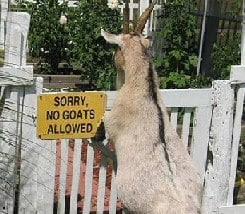
A group of Texas tourists were on a bus tour of France when they came upon the town of Sancerre in the Loire Valley. They eventually stopped at the little village of Chavignol and visited a cheese farm where the world-famous ‘Crottin de Chavignol’ goat’s cheese is made; their guide, who was the farmer’s wife, led them through a process of cheese making, explaining how
goat’s milk was used.
Madame showed the group a picturesque hillside where many goats were grazing. These, she explained, were the older goats put out to pasture when they no longer produced. Madame then asked, turning to the group, ‘What do you do in Texas with your old goats that aren’t producing?’
One spry and very quick elderly gentleman answered, ‘They send us on bus tours.’
Football Pig Funny Animal Stories
Not surprisingly, football pigs are great inspirations for funny animal stories.
Pig Banned From Football Match in St Petersburg
A Russian farmer who tried to take his pig to a top football game was barred after police decided it could ‘ incite a riot’. Football fan Vladimir Kisilev from St Petersburg took his prize-winning pig to a show in Moscow and wanted to watch a national Premier League match afterward. He took the pig along with him, as he had nowhere to leave it, but police banned the pig from the ground for the match between Spartak Moscow and St Petersburg Zenit.
Officers feared the pig could provoke a riot as Spartak Moscow fans are called ‘ Pigs’ by their St Petersburg Zenit rivals. Kisilev said, ‘I wanted to see the game, but had nowhere to leave the pig. I almost managed to get it into the ground in a big bag but it started grunting and the police noticed.’
Farm Worker Attacked by Herd of Pigs
Norfolk England – January 2007
A farm worker needed hospital treatment after being attacked by a herd of pigs, Norfolk police said on Sunday. The 51-year-old man was knocked over by a sow at a Norfolk farm, prompting the rest of the herd to attack him.
‘It seems that when he fell, he was attacked by one of the sows and then the other pigs joined in,’ a Norfolk police spokesman told Reuters.
‘He suffered bumps and bruises and a head injury though it is not considered to be life-threatening.’ The police spokesman said it was the first time he had heard of a pig attack in the area – but it was unlikely the herd would be put down.
Talking of pigs, see what they were up to in China: Athletic pigs ham it up at the Olympics in China
The Leopardess and the Mouse
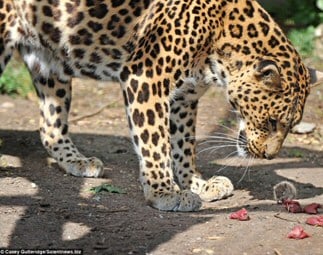
This cheeky mouse put its life in the hands of a leopard. The rodent does not look emaciated, thus we must assume that it was oblivious to the danger of a leopard. The only narrative that makes sense is that an English mouse had no experience of an African leopard.
Actually, the great cat is a leopardess who is a resident at the Santago Rare Leopard Project in Hertfordshire, England. At one stage Sheena attempted to nudge the mouse away with her nose, but the determined little chap carried on eating.
It was Casey Gutteridge who captured this amazing scene he said: ‘I have no idea where the mouse came from – he just appeared in the enclosure after the keeper had dropped in the meat for the leopard. ‘He didn’t take any notice of the leopard, just went straight over to the meat and started feeding himself. ‘But the leopard was pretty surprised – she bent down
and sniffed the mouse and flinched a bit like she was scared. ‘In the meantime, the mouse just carried on eating like nothing had happened.
‘It was amazing, even the keeper who had thrown the meat into the enclosure was shocked – he said he’d never seen anything like it before.’
Sheena has been in the Santago Rare Leopard Zoo since she was just four months old. She is one of 14 big cats in the private collection started by Jackie’s late husband Peter in 1989.
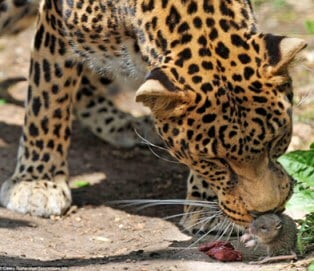
Another Useless Cat and Mouse Story
A cat chasing a mouse in Tirana’s main power station caused a 72-hour blackout across parts of the Albanian capital, the electricity company reported last week, Will and Guy have learned.
‘A cat and a mouse ran into the high-voltage cables,’ a company spokeswoman said, showing pictures of the electrocuted animals. ‘We took pictures because we’ve never had anything like this,’ she added.
Albanians complain bitterly about the power cuts that have plagued them for decades and are mostly blamed on drought and the dilapidation of the extremely old-fashioned grid.





